Fuel Tank Replacement RPO NT7
Tools Required
J 45722 Fuel Sender Lock Ring Wrench
Removal Procedure
- Relieve the fuel system pressure. Refer to Fuel Pressure Relief .
- Drain the fuel tank. Refer to Fuel Tank Draining .
- Remove the left rear wheel house liner. Refer to Rear Wheelhouse Panel Liner Replacement .
- Using compressed air, blow any dirt and/or debris from around the fuel fill pipe and evaporative emission (EVAP) line connections.
- Loosen the fuel fill hose clamp (1) at the fill pipe.
- Disconnect the fuel fill hose (2) from the fuel fill pipe.
- Disconnect the fuel tank EVAP recirculation line quick connect fitting (1) from the fill pipe line. Refer to Plastic Collar Quick Connect Fitting Service .
- Disconnect the left and right electronic position sensor links (1) from the ball studs. (left side shown, right side similar).
- Disconnect the fill pipe vent line (2) and the fuel tank vapor line (3) quick connect fittings from the EVAP canister. Refer to Plastic Collar Quick Connect Fitting Service .
- Disconnect the fuel feed line quick connect fitting (1) from the chassis line. Refer to Plastic Collar Quick Connect Fitting Service .
- Remove the fuel and EVAP line retainer (1) from the side rail.
- Disconnect the body harness electrical connector from the fuel tank harness electrical connector (1).
- Remove the fuel tank harness clips (2, 3) from the rear compartment side rail.
- Remove the exhaust system. Refer to Exhaust System Replacement .
- Loosen the left and right rear brake hose bracket nut and slide the stud out of the keyhole slot in the side rail. (left side shown, right side similar).
- Remove the rear shock bolts.
- Support the front of the vehicle with a jack stand at the engine cradle.
- Support the rear suspension crossmember with a suitable adjustable jack.
- Remove the rear suspension crossmember bolts.
- Using the adjustable jack (1), slowly lower the rear suspension crossmember allowing the crossmember to pivot at the front bolts, until the rear springs can be removed.
- Remove the rear coil springs.
- Remove the fuel tank strap bolts.
- Remove the fuel tank straps.
- Remove the fuel tank.
- Place the fuel tank on a suitable work surface.
- Disconnect the fuel tank electrical harness connectors from the module and pressure sensor.
- Remove the electrical harness.
- Disconnect the fuel feed line quick connect fitting from the module. Refer to Plastic Collar Quick Connect Fitting Service .
- Remove the fuel feed line from the retaining feature in the fuel tank.
- Remove the fuel feed line.
- Install the J 45722 to the lock ring.
- Use the J 45722 and a long breaker bar in order to unlock the fuel module lock ring. Rotate the lock ring in a counterclockwise direction.
- Remove the J 45722 and the fuel module lock ring.
- Slowly raise the module until the fuel level sensor float arm is just visible.
- Tilt the module toward the rear of the fuel tank to allow the level sensor float arm to clear the tank opening. Remove the module from the tank.
- Carefully discard the fuel in the module bucket into an approved container.
- Remove and discard the fuel pump module O-ring seal.
- Place the lock ring on a flat surface. Measure the clearance between the lock ring and the flat surface using a feeler gage at 7 different points.
- If the warpage is less than 0.41 mm (0.016 in), the lock ring does not require replacement.
- If the warpage is greater than 0.41 mm (0.016 in), the lock ring must be replaced.
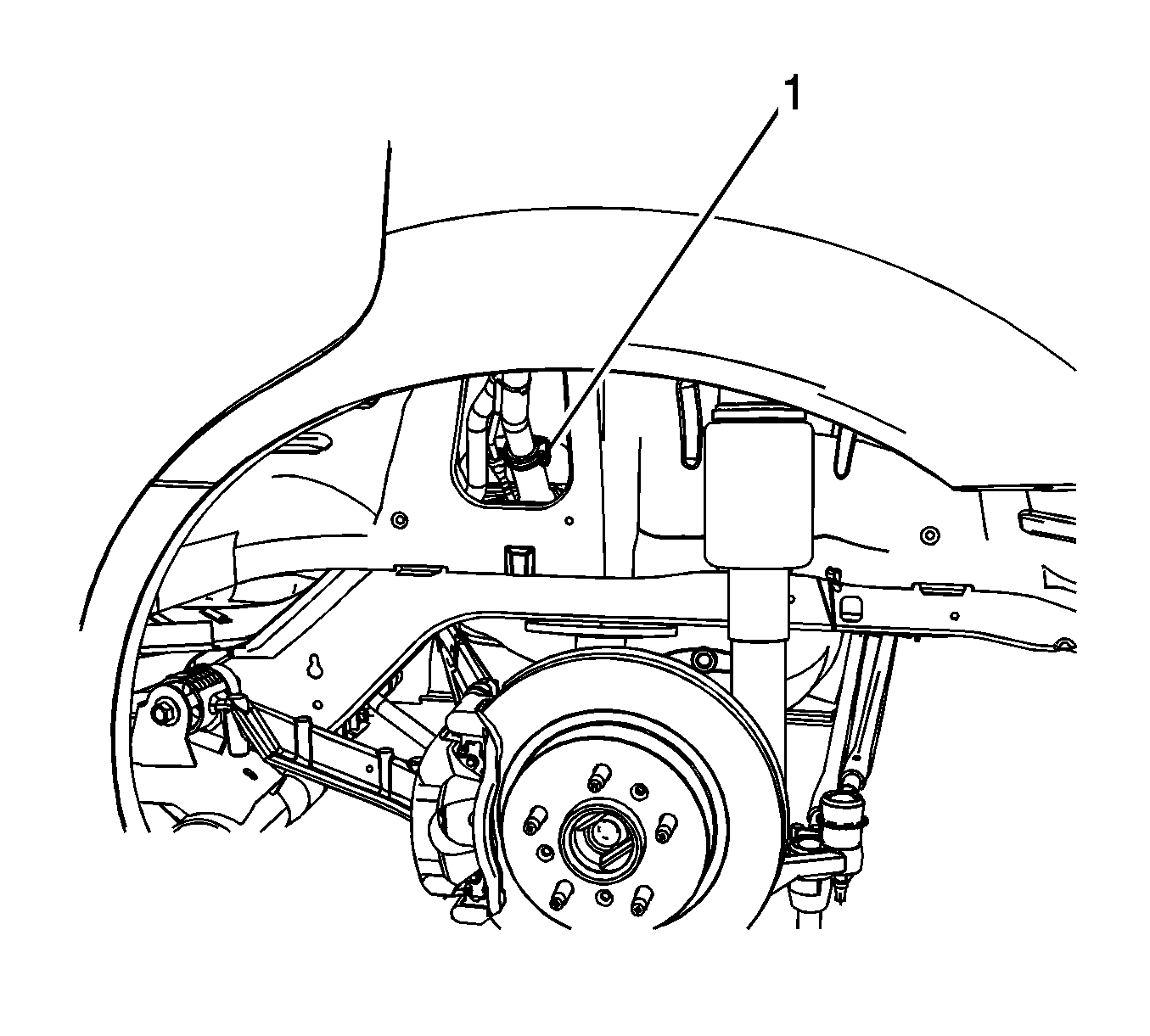
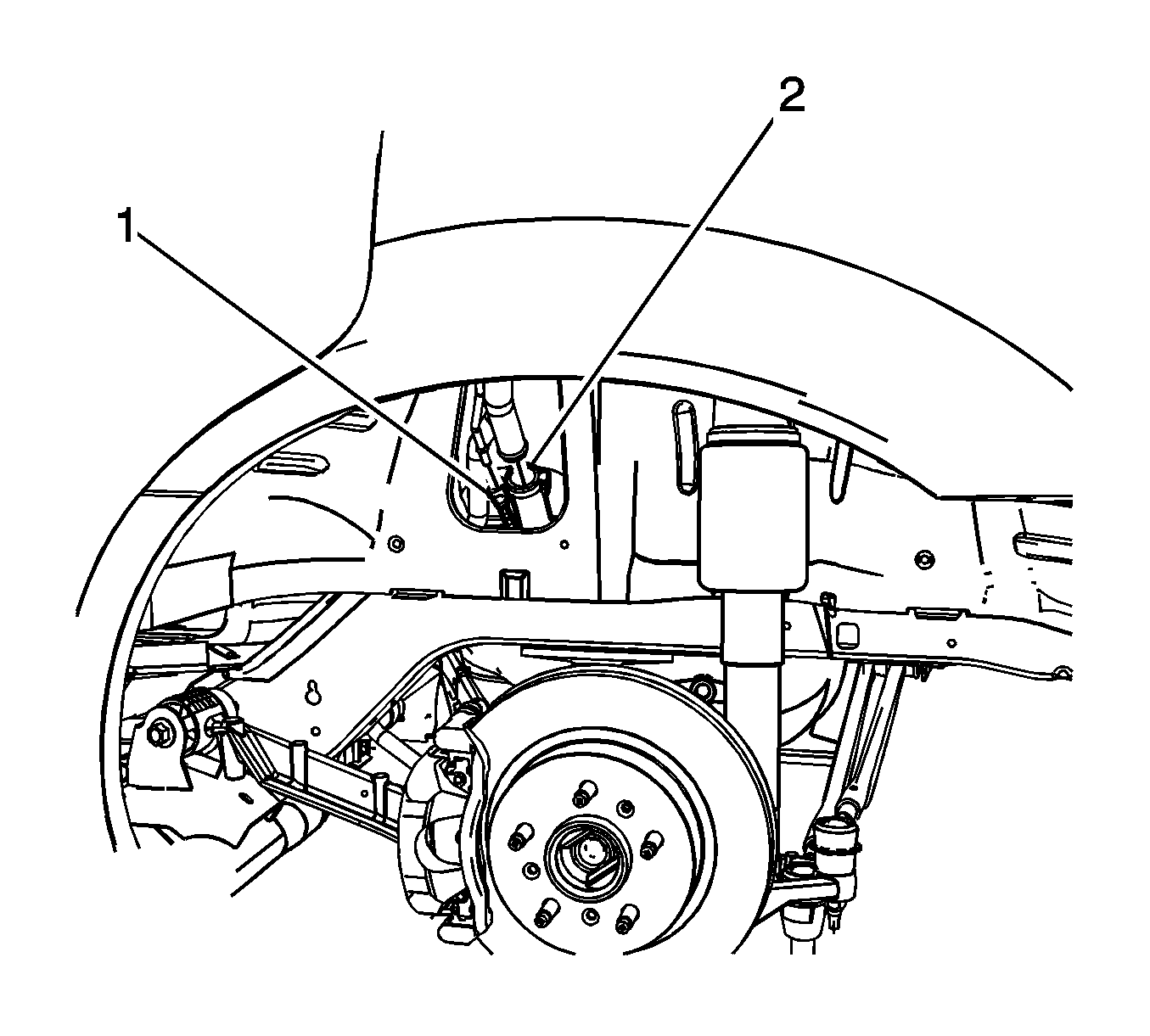
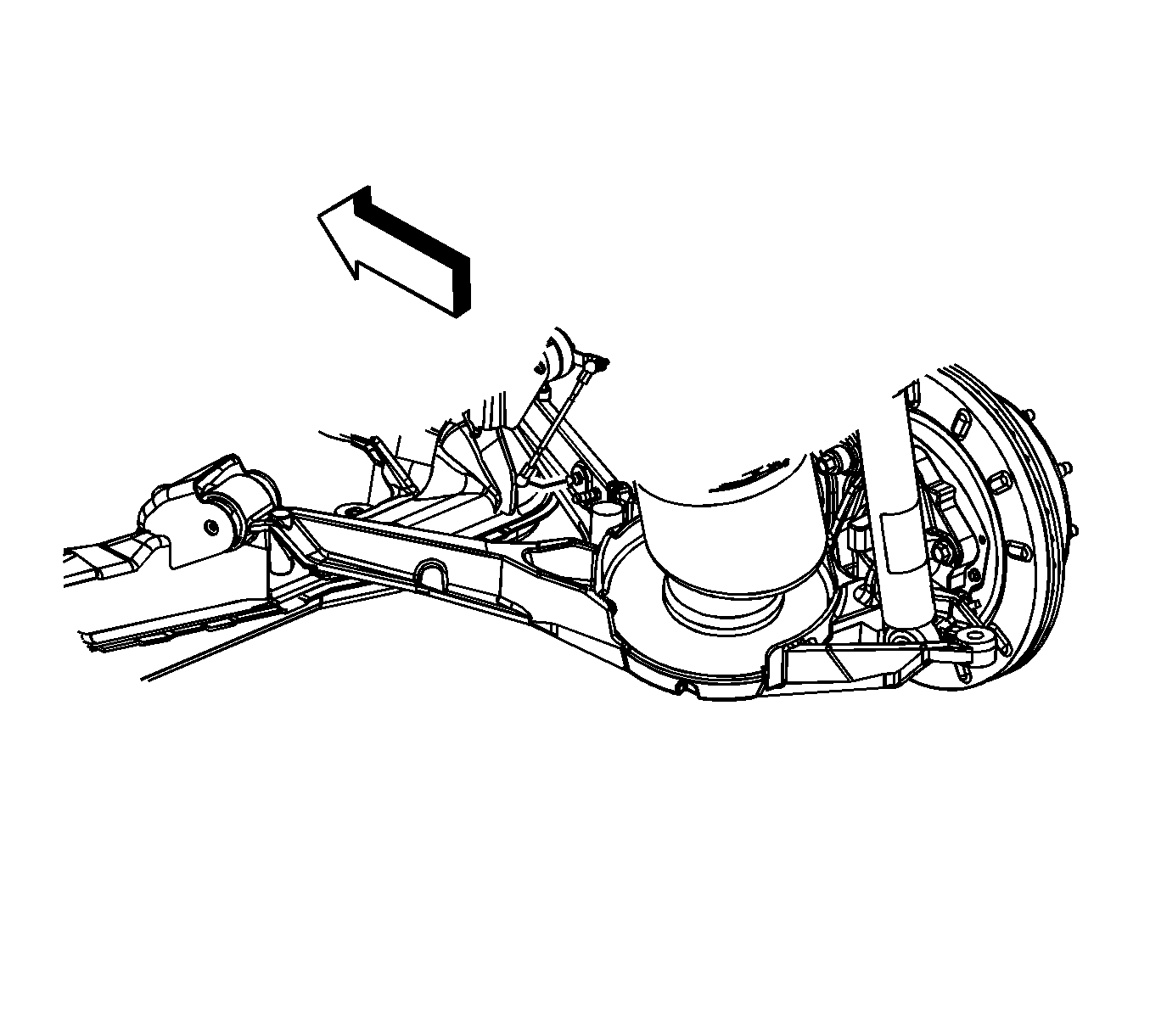
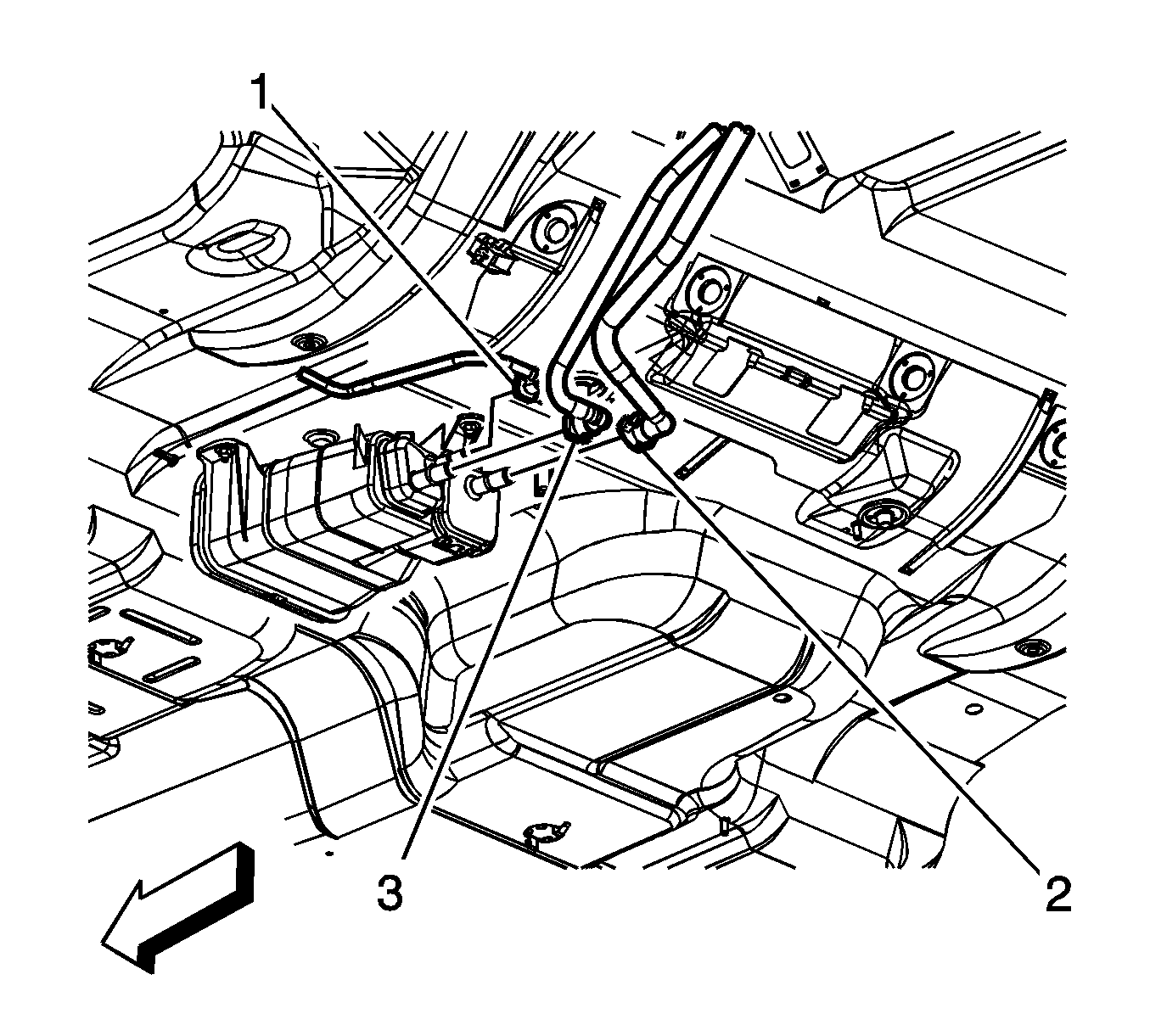
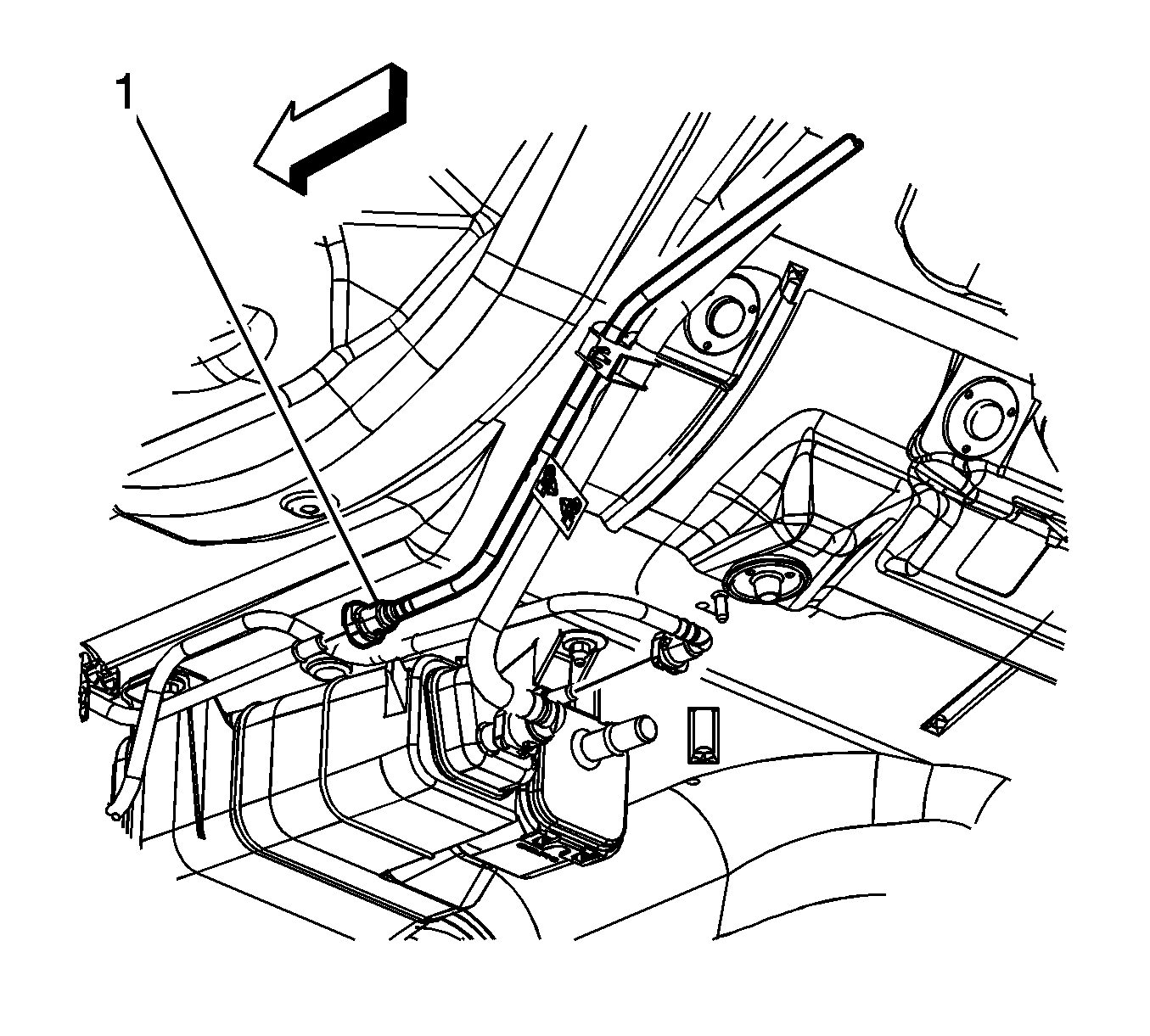
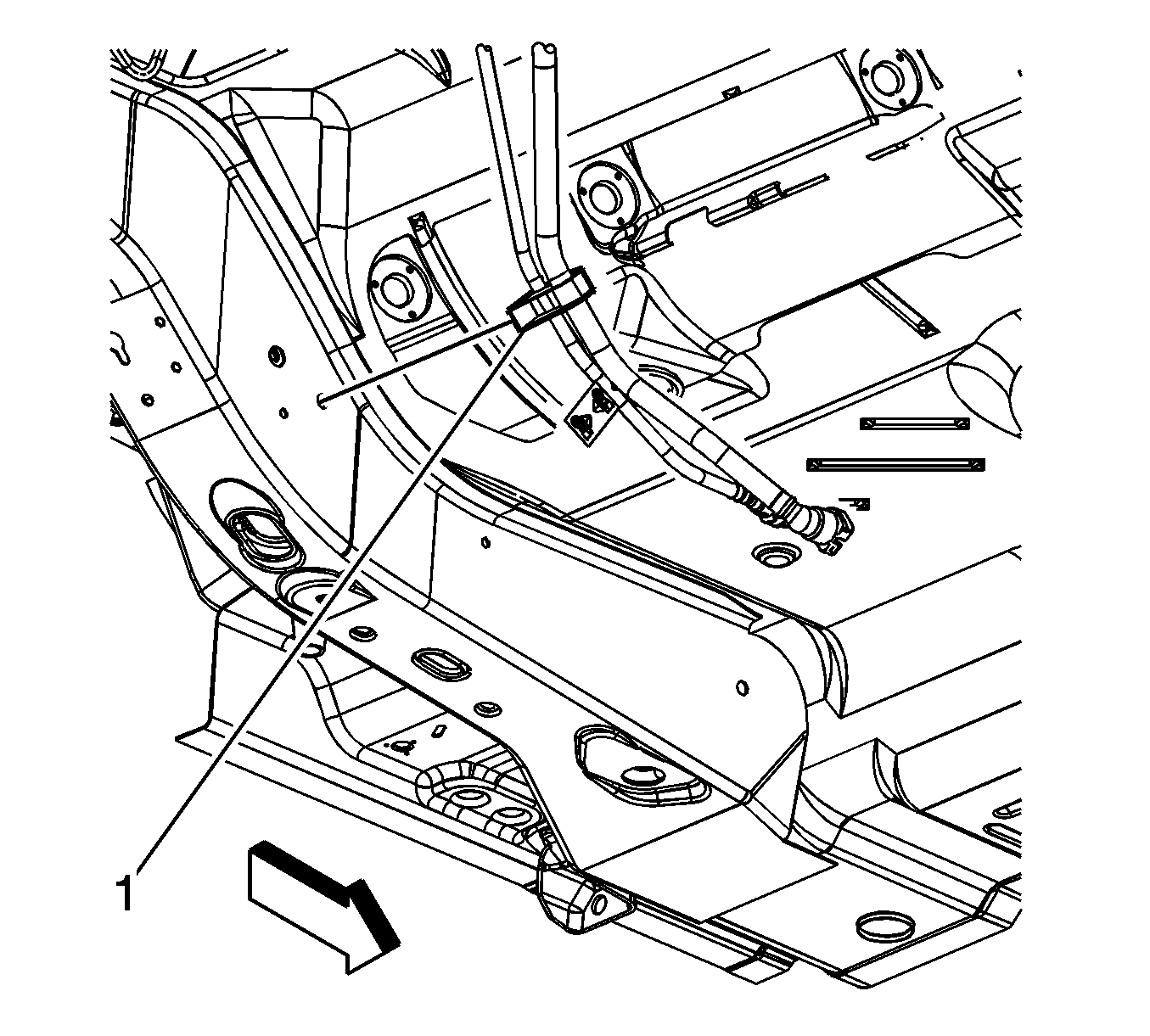
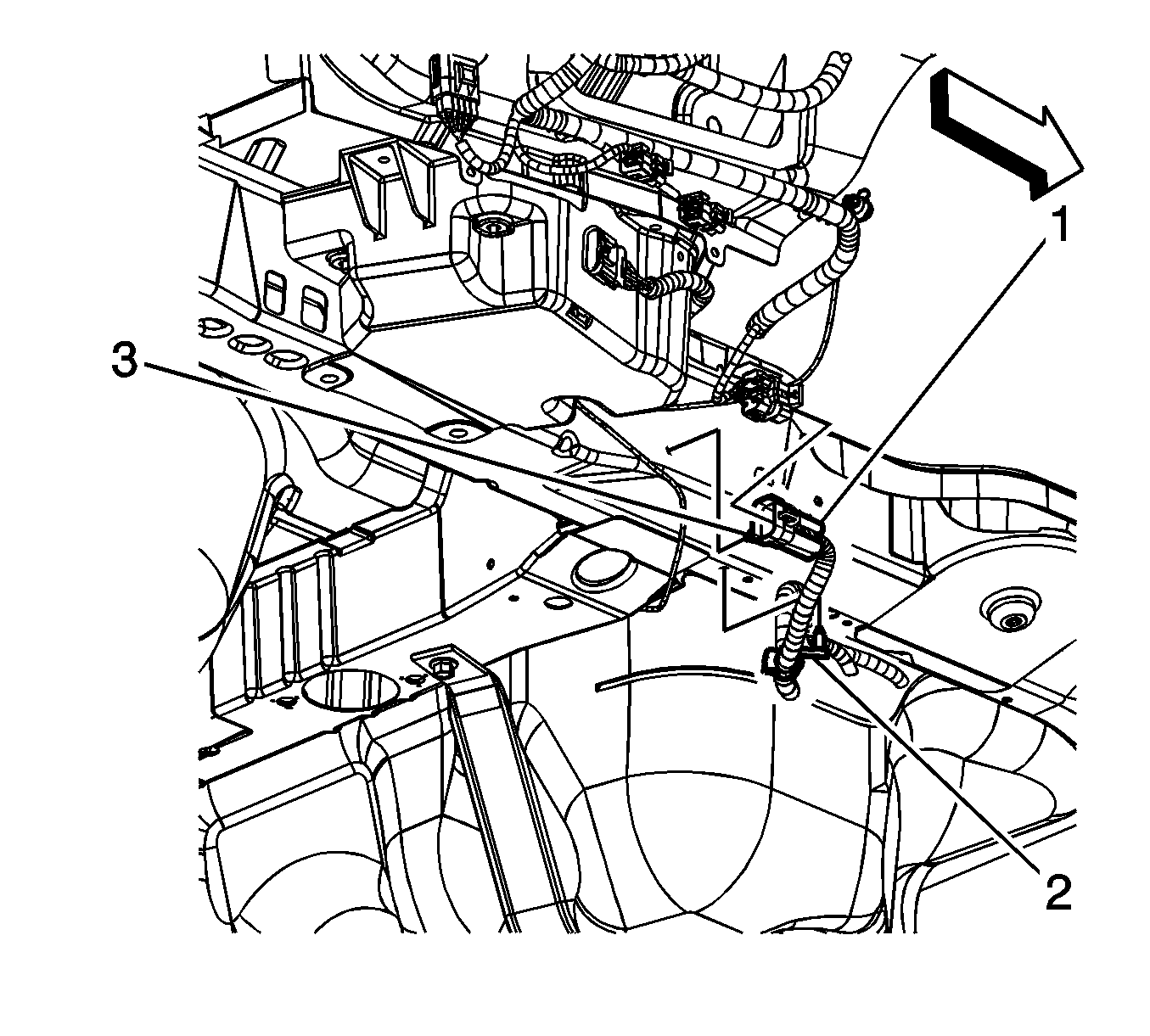
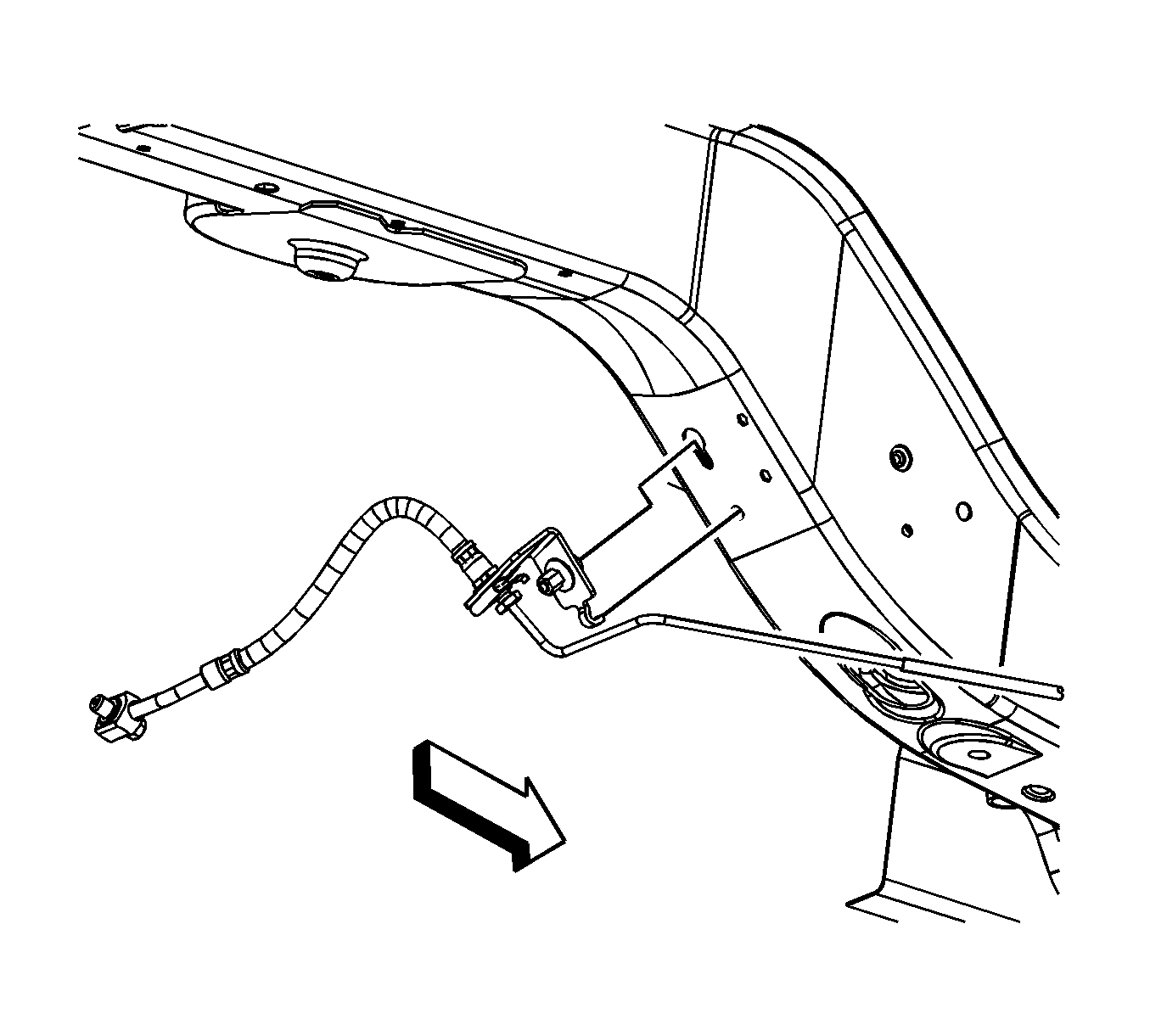
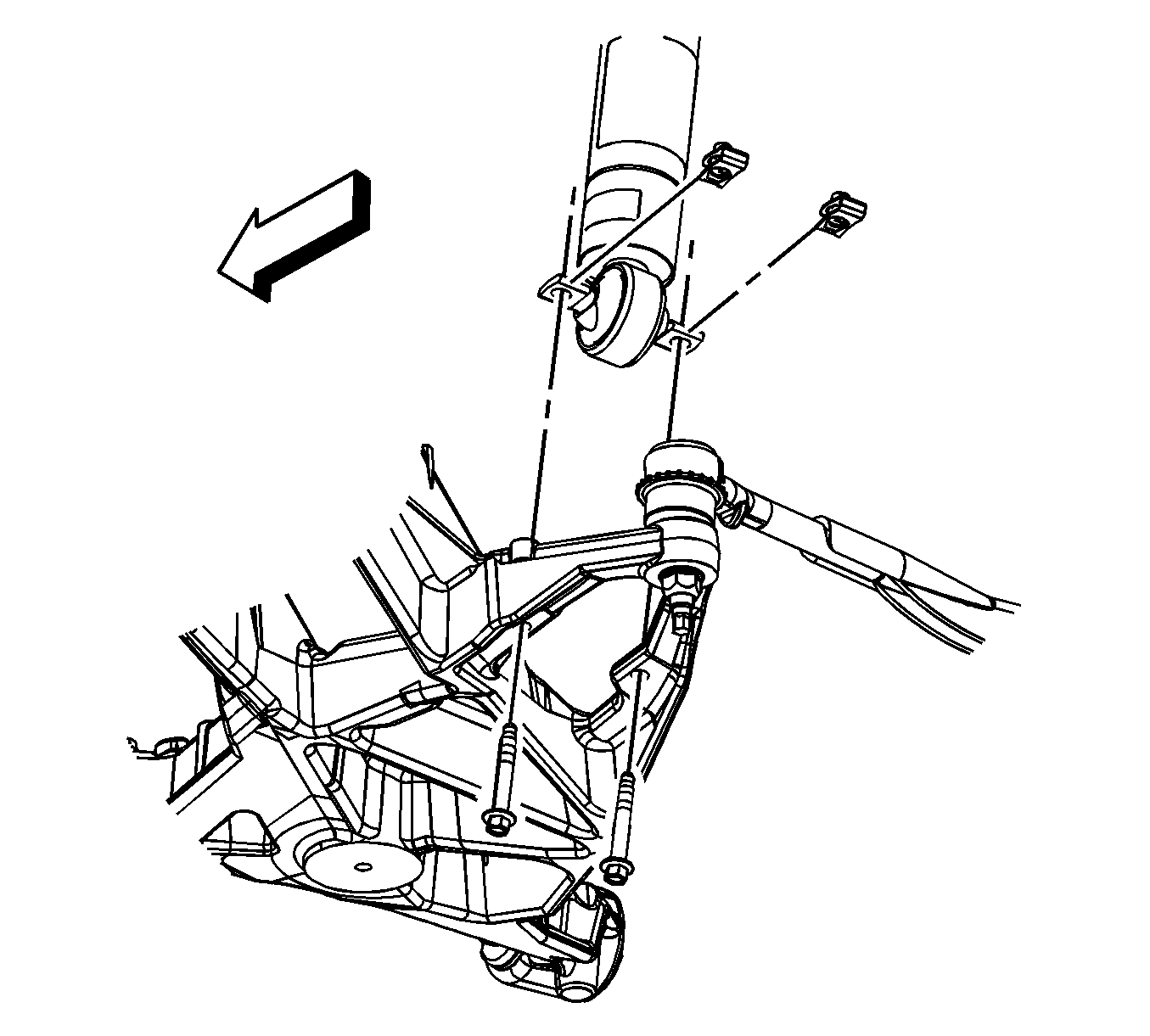
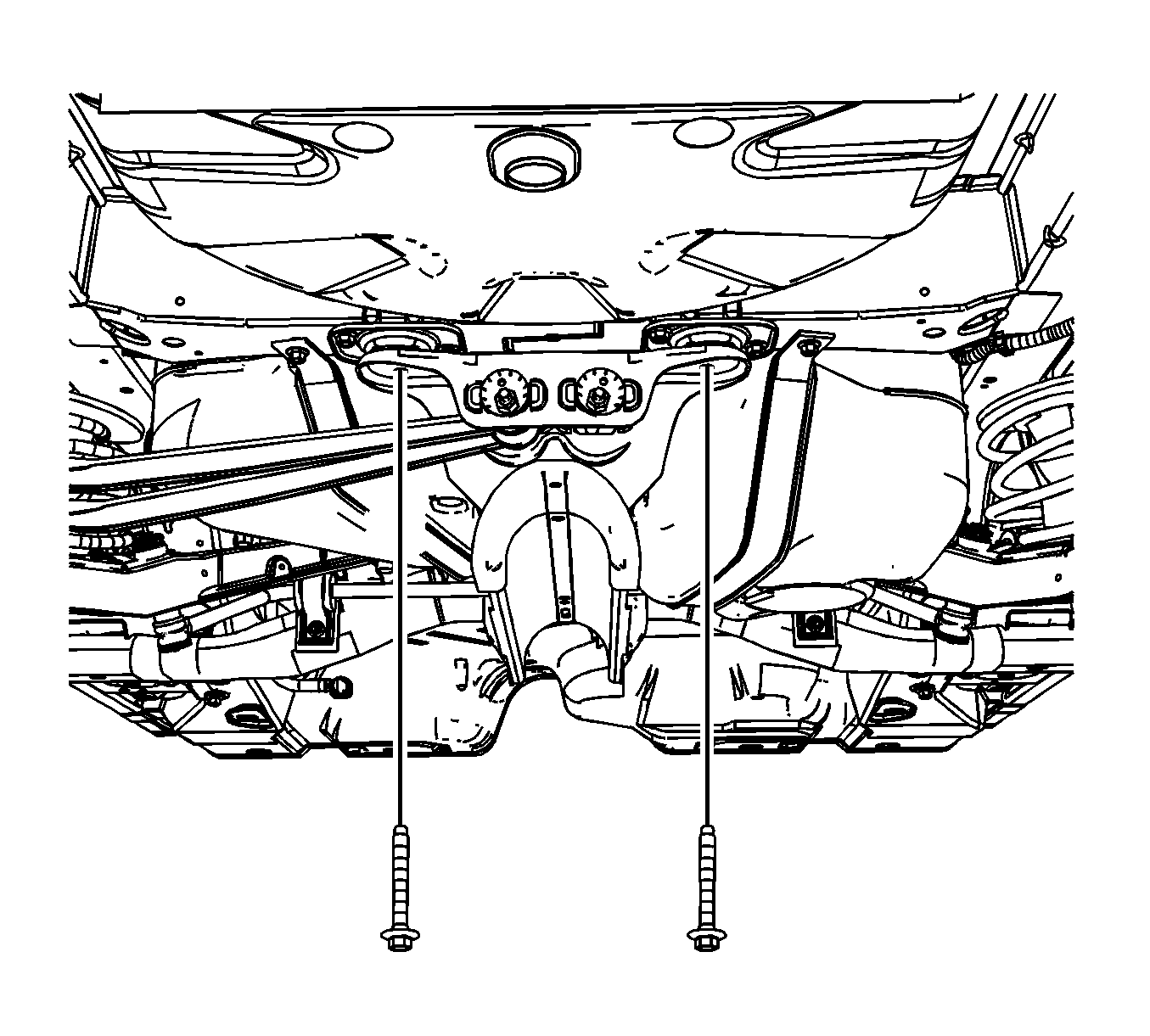
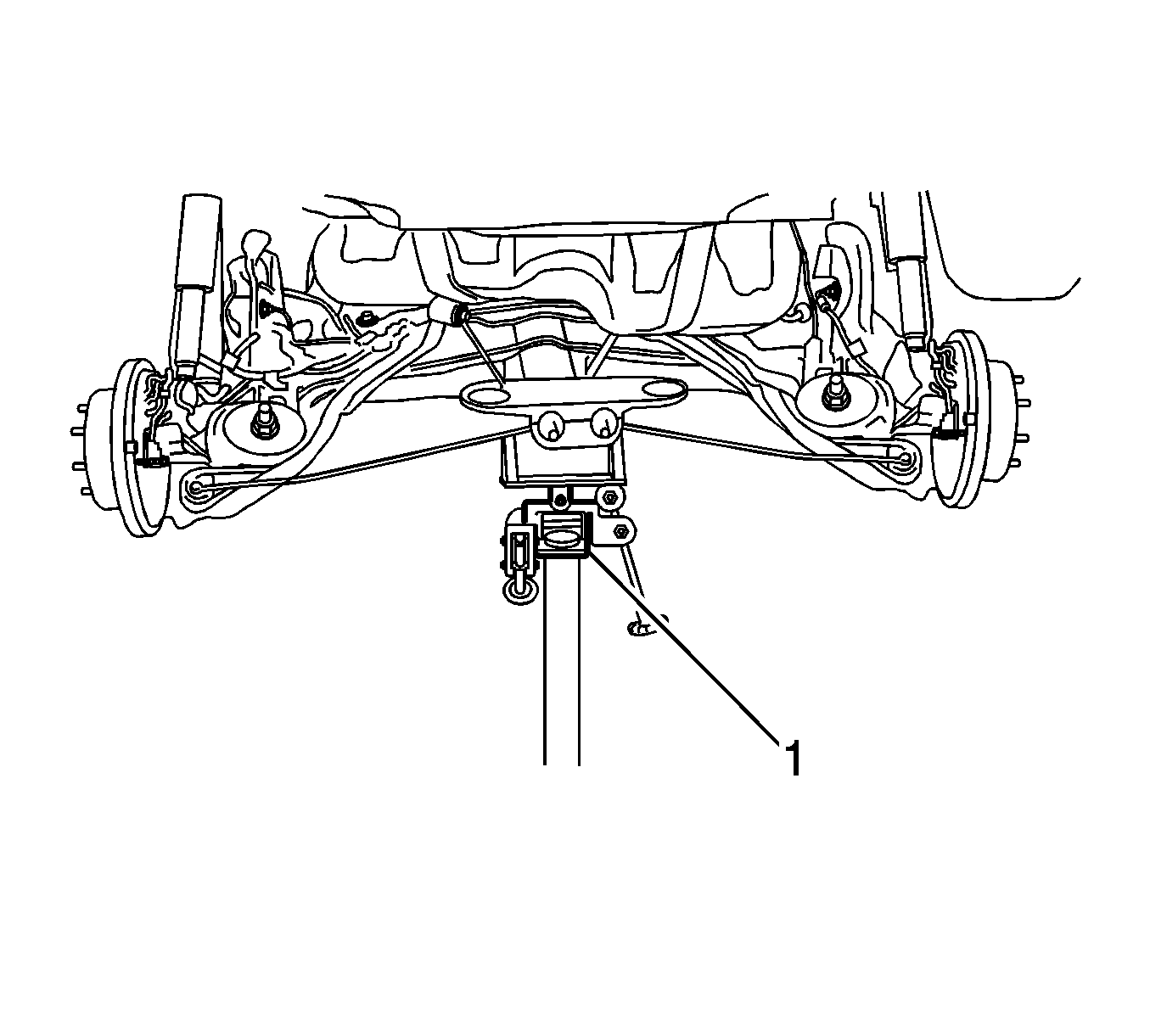
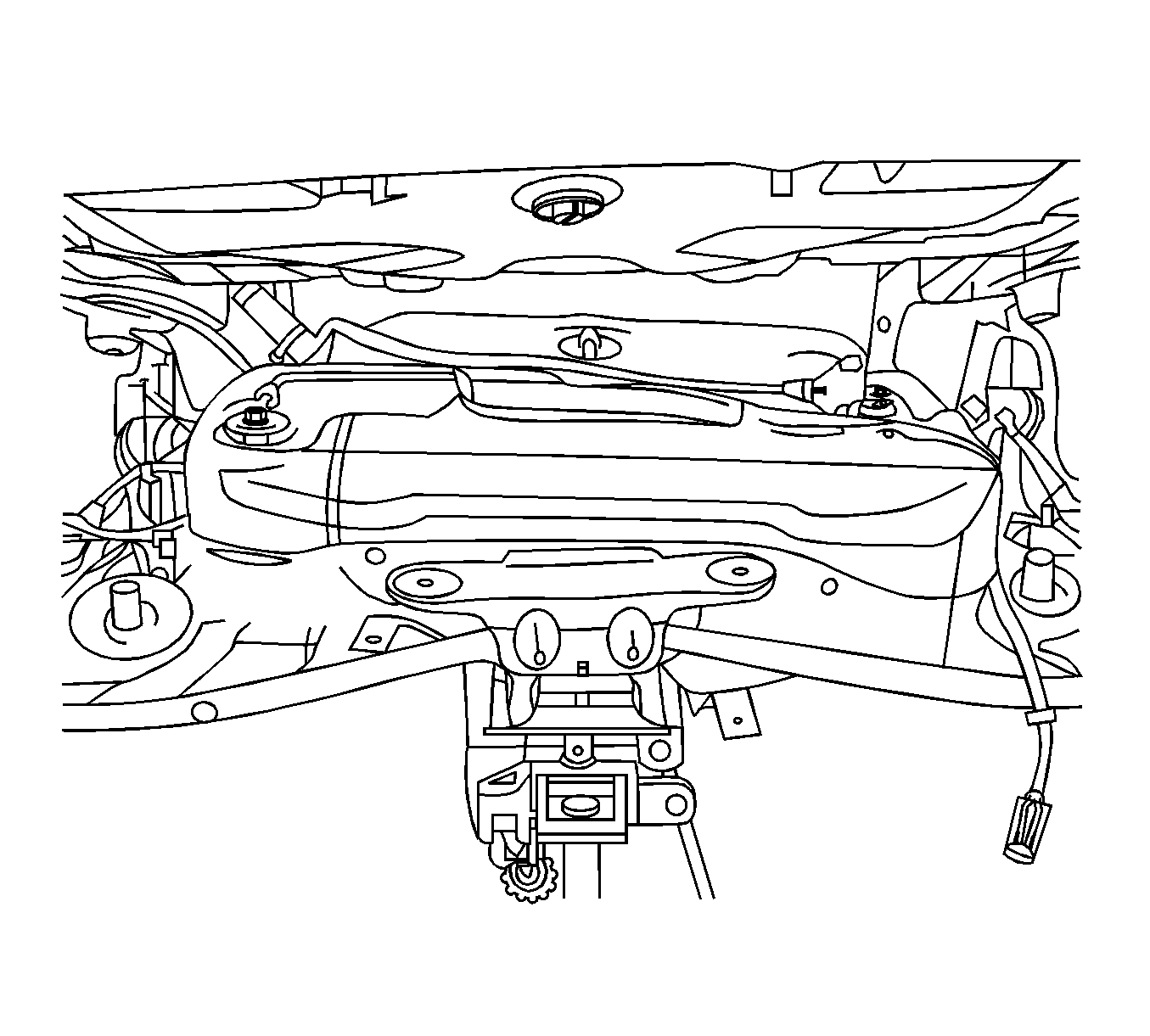
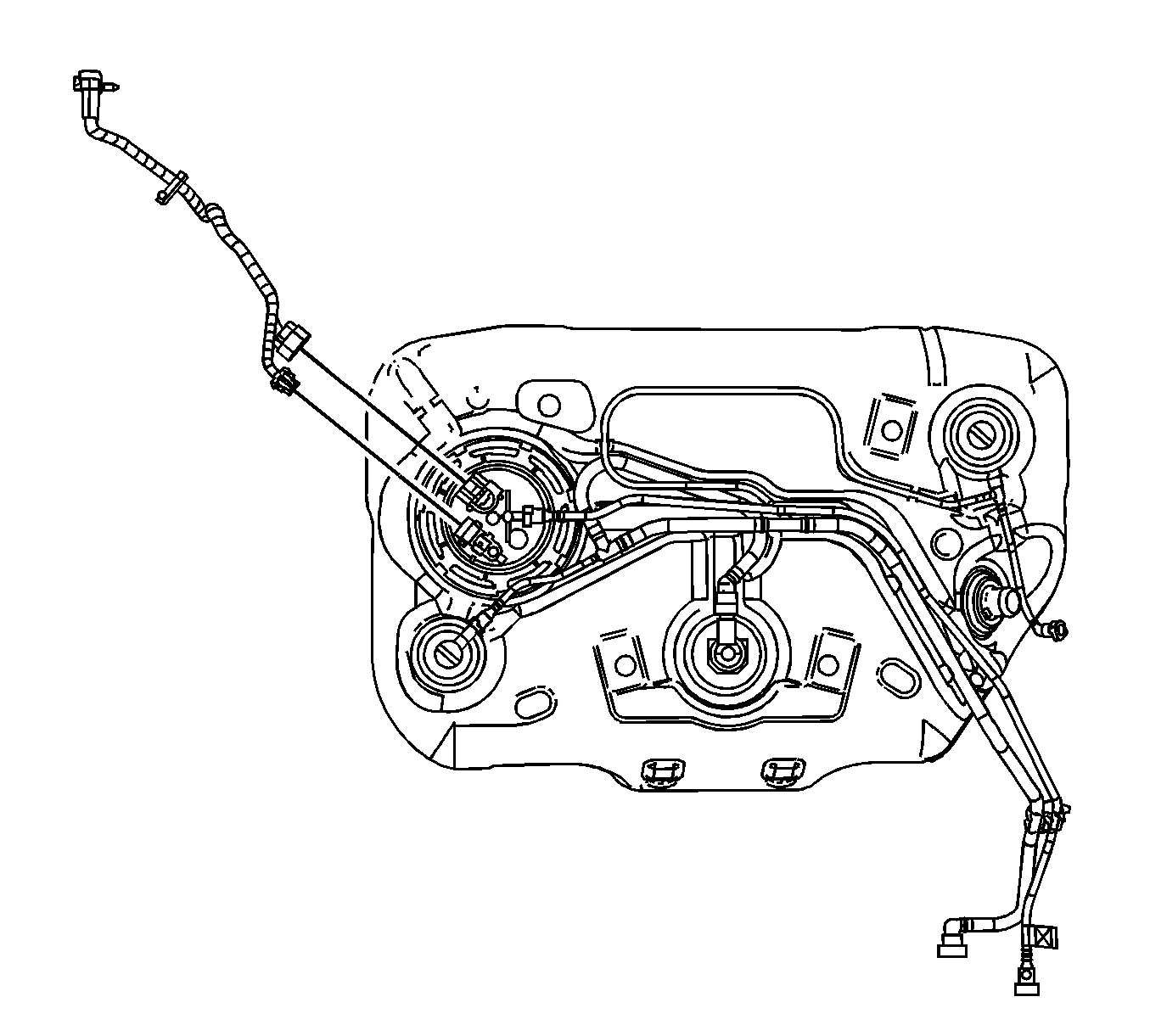
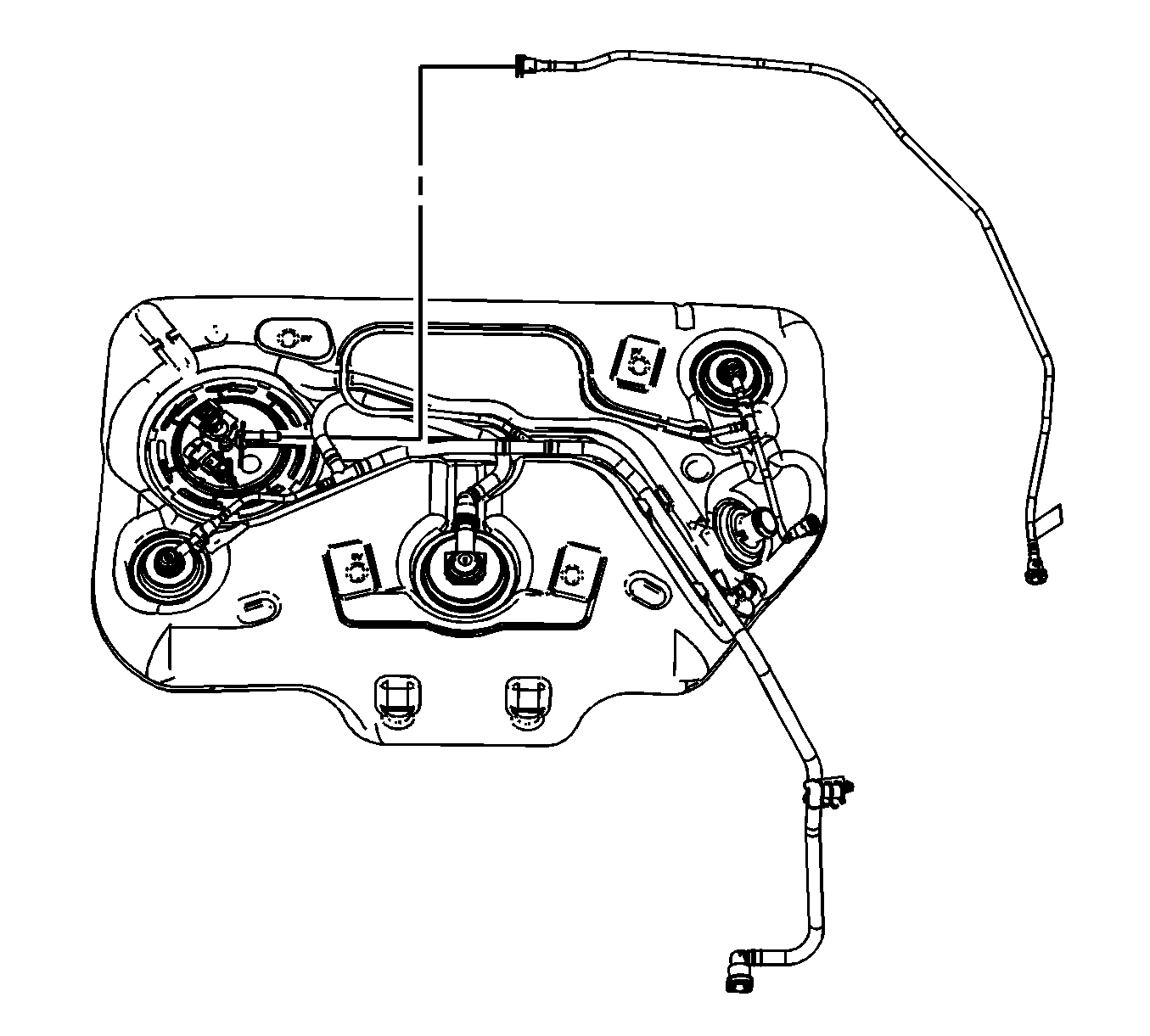
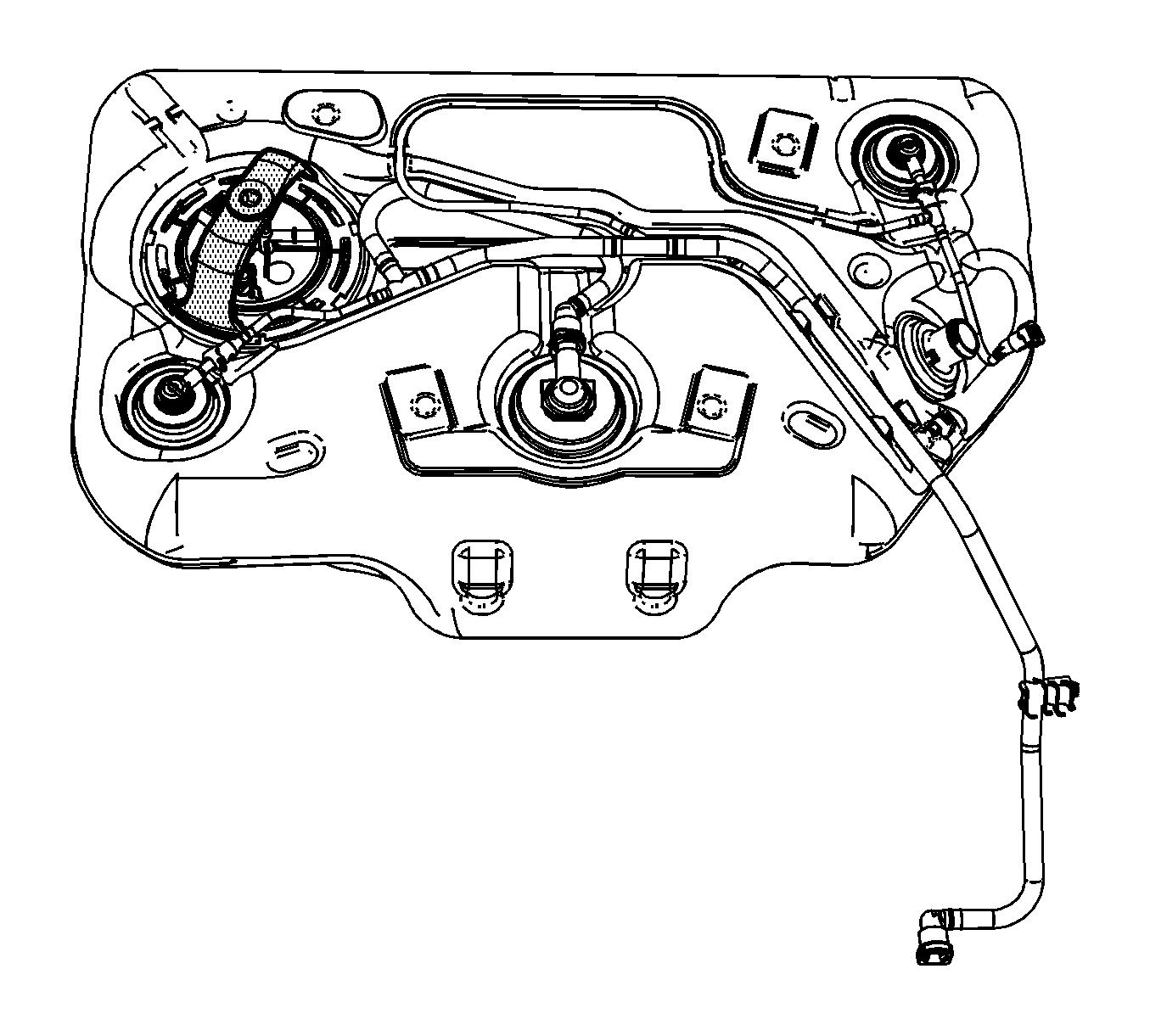
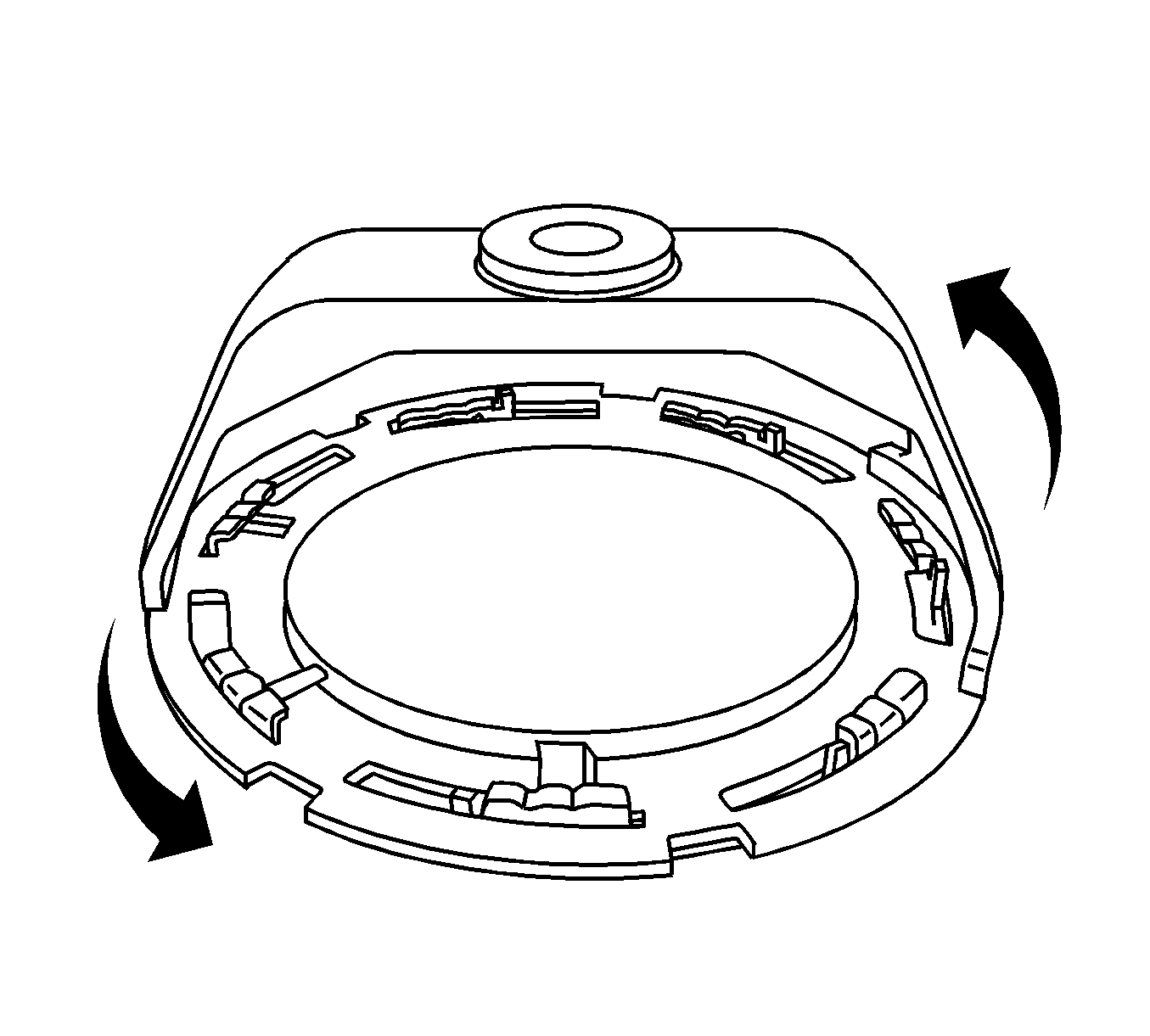
Notice: Avoid damaging the lock ring. Use only J-45722 to prevent damage to the lock ring.
Notice: Do Not handle the fuel sender assembly by the fuel pipes. The amount of leverage generated by handling the fuel pipes could damage the joints.
Important:
• The fuel module assembly may spring up from its position. • When removing the fuel module assembly from the fuel tank, be aware that the reservoir bucket is full of fuel. It must be tipped slightly during removal to avoid damage to the float. Discard the fuel module assembly O-ring seal and replace it with
a new one. • Carefully discard the fuel in the reservoir bucket into an approved container.
Important: Do NOT use impact tools. Significant force will be required to release the lock ring. The use of a hammer and screwdriver in not recommended. Secure the fuel tank in order to prevent fuel tank rotation.
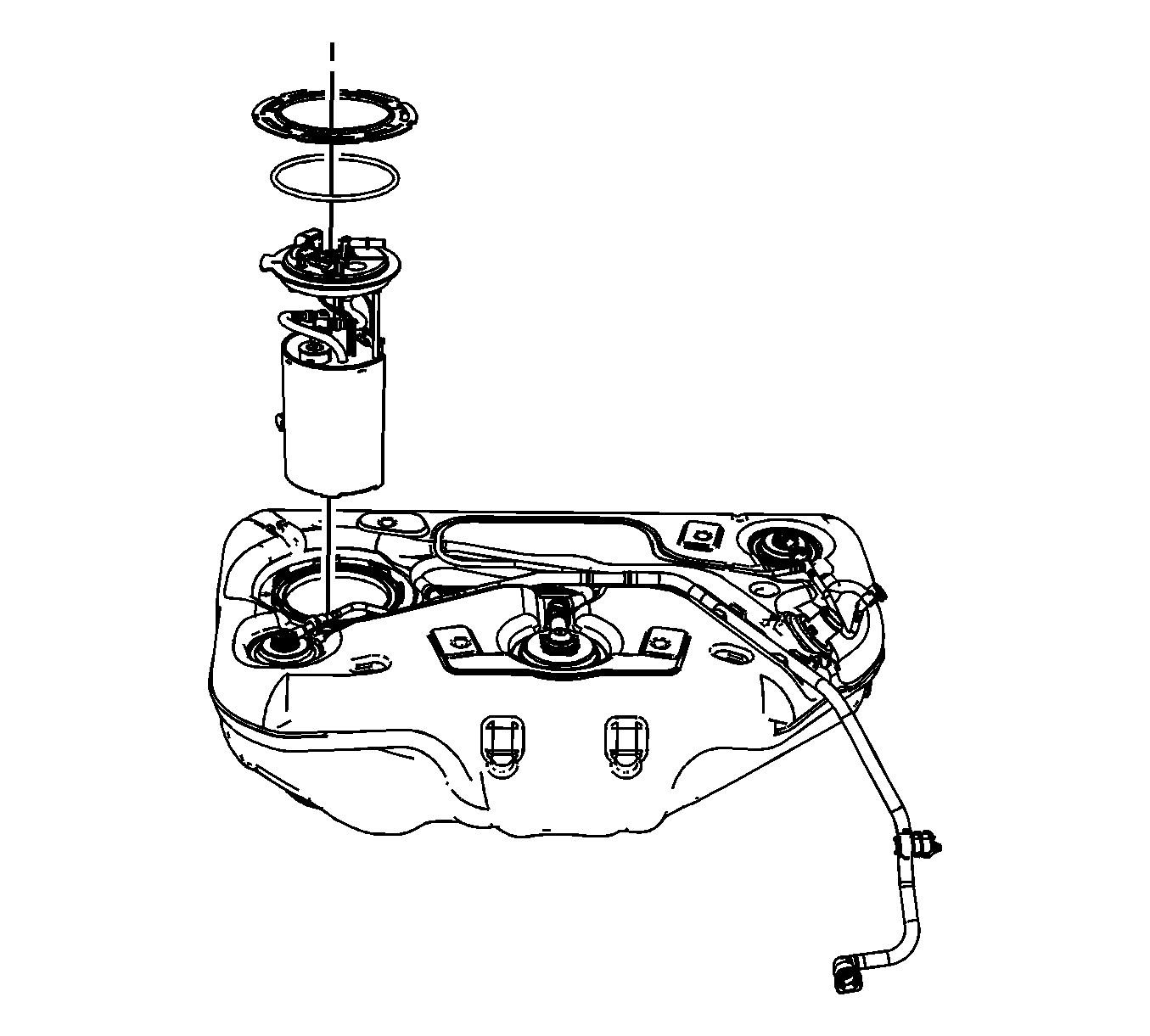
Important: When removing the module from the fuel tank, be aware that the reservoir bucket is full of fuel. The module must be tipped slightly during removal to avoid bending the fuel level sensor float arm.
Important: DO NOT reuse the old fuel pump module seal.
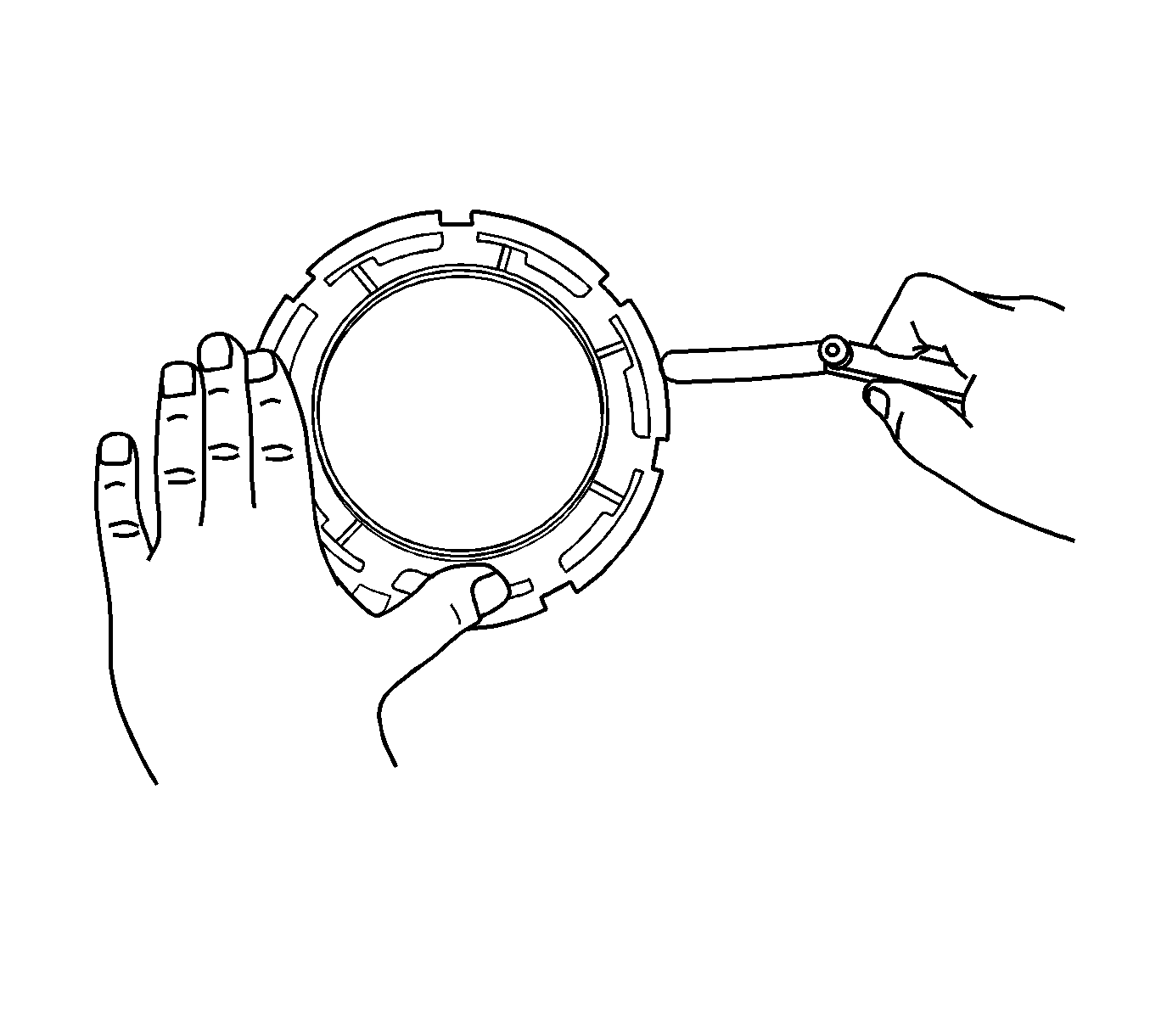
Important:
• Some lock rings were manufactured with DO NOT REUSE stamped into them. These lock rings may be reused if they are not damaged or warped. • Inspect the lock ring for damage due to improper removal or installation procedures. If damage is found, install a NEW lock ring. • Check the lock ring for flatness.
Installation Procedure
- Place a NEW fuel pump module O-ring seal onto the fuel tank.
- Tilt the module toward the rear of the fuel tank to allow the fuel level sensor float arm to clear the tank opening. Install the module into the fuel tank.
- Lower the module assembly into the tank.
- Install the module lock ring, and move it into position on the top of the module.
- Install the J 45722 to the lock ring .
- Using the J 45722 and a breaker bar, rotate the fuel pump module lock ring clockwise until the ring is locked into place on the fuel tank.
- Remove the J 45722 .
- Install the fuel feed line.
- Connect the fuel feed line quick connect fitting to the module. Refer to Plastic Collar Quick Connect Fitting Service .
- Install the fuel feed line to the retaining feature in the fuel tank.
- Install the electrical harness.
- Connect the fuel tank electrical harness connectors to the module and pressure sensor.
- Place the fuel tank onto the rear suspension crossmember.
- Install the fuel tank straps.
- Install the fuel tank strap bolts.
- Install the rear coil springs while slowly raising the rear suspension crossmember using the adjustable jack (1).
- Install the rear suspension crossmember bolts.
- Remove the adjustable jack from the rear suspension crossmember.
- Remove the jack stand from the front of the vehicle.
- Install the rear shock bolts.
- Connect the body harness electrical connector to the fuel tank harness electrical connector (1).
- Install the fuel tank harness clips (2, 3) to the rear compartment side rail.
- Install the fuel and EVAP line retainer (1) to the side rail.
- Connect the fuel feed line quick connect fitting (1) to the chassis line. Refer to Plastic Collar Quick Connect Fitting Service .
- Connect the fill pipe vent line (2) and the fuel tank vapor line (3) quick connect fittings to the EVAP canister. Refer to Plastic Collar Quick Connect Fitting Service .
- Install the left and right rear brake hose bracket studs into the keyhole slots. Tighten the nuts. (left side shown, right side similar).
- Install the exhaust system. Refer to Exhaust System Replacement .
- Connect the left and right electronic position sensor links (1) to the ball studs. (left side shown, right side similar).
- Connect the fuel tank EVAP recirculation line quick connect fitting (1) to the fill pipe line. Refer to Plastic Collar Quick Connect Fitting Service .
- Connect the fuel fill hose (2) to the fuel fill pipe.
- Tighten the fuel fill hose clamp (1) at the fill pipe.
- Install the left rear wheel house liner. Refer to Rear Wheelhouse Panel Liner Replacement .
- Fill the fuel tank.
- Connect the negative battery cable. Refer to Battery Negative Cable Disconnection and Connection .
- Perform the following procedure in order to inspect for leaks:
- Install the intake manifold cover. Refer to Intake Manifold Cover Replacement .

Important: The bucket must be slightly tipped during installation to avoid bending the fuel level sensor float arm.
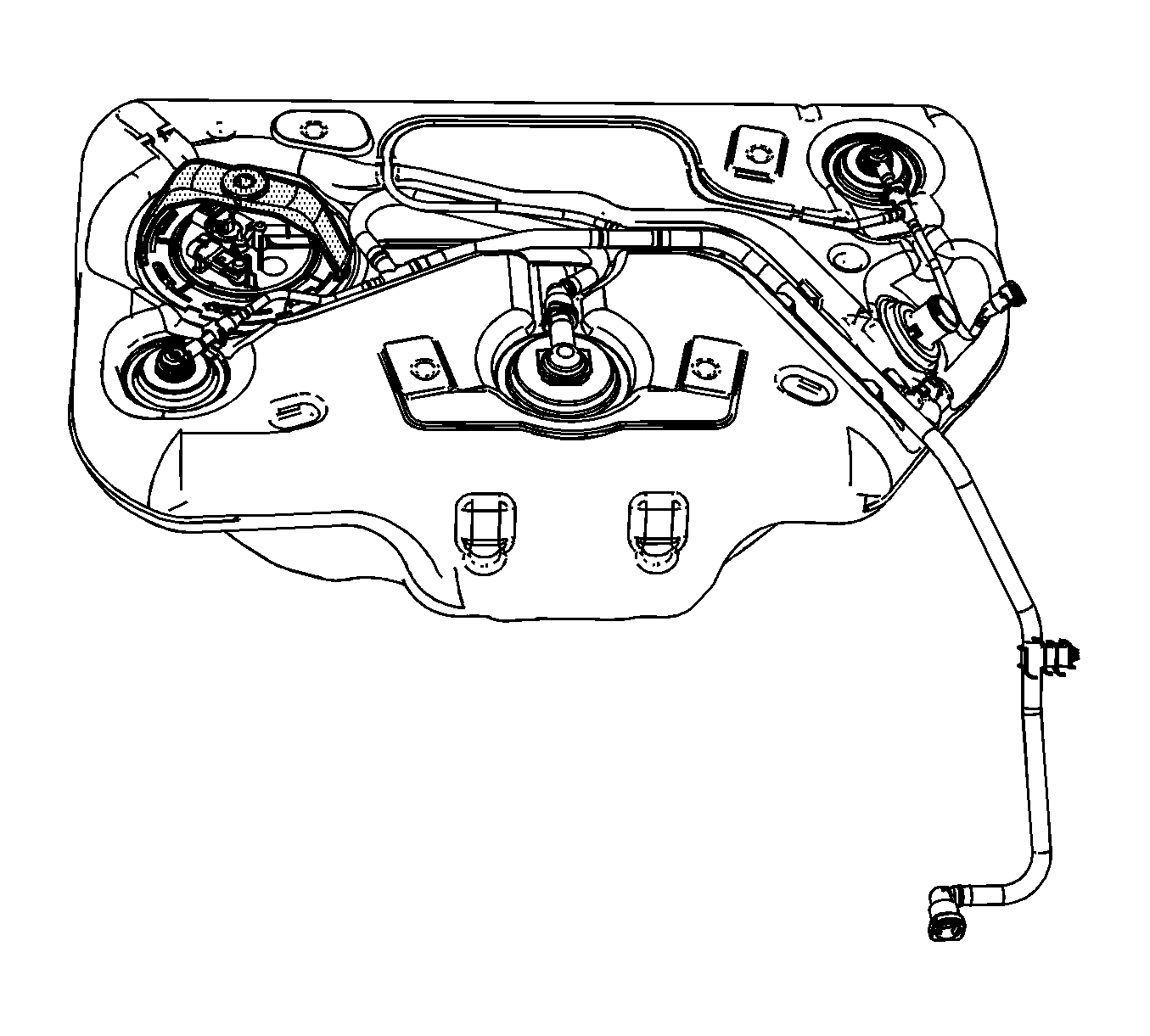

Important: Always replace the fuel sender seal when installing the fuel sender assembly. Replace the lock ring if necessary. Do not apply any type of lubrication in the seal groove.
Ensure the lock ring is installed with the correct side facing upward. A correctly installed lock ring will only turn in a clockwise direction.



Notice: Refer to Fastener Notice in the Preface section.
Tighten
Tighten the bolts to 46 N·m (34 lb ft).

Tighten
Tighten the bolts to 191 N·m (141 lb ft).

Tighten
Tighten the bolts to 25 N·m (18 lb ft).





Tighten
Tighten the nut to 10 N·m (89 lb in).


Important: Clean the fill pipe or any dirt or debris. Ensure the fill pipe is installed to the original depth to the fill hose. The fill pipe bead must be inserted into the hose past the clamp position.

Tighten
Tighten the clamp to 4 N·m (35 lb in).
| 35.1. | Turn ON the ignition, with the engine OFF for 2 seconds. |
| 35.2. | Turn OFF the ignition for 10 seconds. |
| 35.3. | Turn ON the ignition, with the engine OFF. |
| 35.4. | Inspect for fuel leaks. |
Fuel Tank Replacement RPO NU6
Tools Required
J 45722 Fuel Sender Lock Ring Wrench
Removal Procedure
- Relieve the fuel system pressure. Refer to Fuel Pressure Relief .
- Drain the fuel tank. Refer to Fuel Tank Draining .
- Remove the left rear wheel house liner. Refer to Rear Wheelhouse Panel Liner Replacement .
- Using compressed air, blow any dirt and/or debris from around the fuel fill pipe and evaporative emission (EVAP) line connections.
- Loosen the fuel fill hose clamp (1) at the fill pipe.
- Disconnect the fuel fill hose (2) from the fuel fill pipe.
- Disconnect the fuel tank EVAP recirculation line quick connect fitting (1) from the fill pipe line. Refer to Plastic Collar Quick Connect Fitting Service .
- Disconnect the left and right electronic position sensor links (1) from the ball studs. (left side shown, right side similar).
- Disconnect the fill pipe vent line (2) and the fuel tank vapor line (3) quick connect fittings from the EVAP canister. Refer to Plastic Collar Quick Connect Fitting Service .
- Disconnect the fuel feed line quick connect fitting (1) from the chassis line. Refer to Plastic Collar Quick Connect Fitting Service .
- Disconnect the fuel tank wiring harness electrical connector (2) from the fuel tank pressure sensor.
- Remove the fuel and EVAP line retainer (1) from the side rail.
- Disconnect the body harness electrical connector from the fuel tank harness electrical connector (1).
- Remove the fuel tank harness clips (2, 3) from the rear compartment side rail.
- Remove the exhaust system. Refer to Exhaust System Replacement .
- Loosen the left and right rear brake hose bracket nut and slide the stud out of the keyhole slot in the side rail. (left side shown, right side similar).
- Remove the rear shock bolts.
- Support the front of the vehicle with a jack stand at the engine cradle.
- Support the rear suspension crossmember with a suitable adjustable jack.
- Remove the rear suspension crossmember bolts.
- Using the adjustable jack (1), slowly lower the rear suspension crossmember allowing the crossmember to pivot at the front bolts, until the rear springs can be removed.
- Remove the rear coil springs.
- Remove the fuel tank strap bolts.
- Remove the fuel tank straps.
- Remove the fuel tank.
- Place the fuel tank on a suitable work surface.
- Cut the tape (1 and 2) securing the fuel tank vent line to the fuel feed line.
- Remove the retainer (3) from the vent and fuel feed lines.
- Disconnect the fuel feed line quick connect fitting from the module. Refer to Plastic Collar Quick Connect Fitting Service .
- Remove the fuel feed line.
- Disconnect the fuel tank vent line quick connect fittings from the module. Refer to Plastic Collar Quick Connect Fitting Service .
- Remove the fuel tank vapor lines.
- Disconnect the fuel tank electrical harness connector from the module.
- Remove the electrical harness from the retaining features on the fuel tank.
- Remove the electrical harness.
- Install the J 45722 to the lock ring.
- Use the J 45722 and a long breaker bar in order to unlock the fuel module lock ring. Rotate the lock ring in a counterclockwise direction.
- Slowly raise the module until the internal vent line quick connect fittings (1) are visible.
- Disconnect the internal vent line quick connect fittings from the module flange. Refer to Plastic Collar Quick Connect Fitting Service .
- Remove the J 45722 and the fuel module lock ring.
- Slowly raise the module until the fuel level sensor float arm is just visible.
- Tilt the module toward the rear of the fuel tank to allow the level sensor float arm to clear the tank opening. Remove the module from the tank.
- Carefully discard the fuel in the module bucket into an approved container.
- Remove and discard the fuel pump module O-ring seal.
- Place the lock ring on a flat surface. Measure the clearance between the lock ring and the flat surface using a feeler gage at 7 different points.
- If the warpage is less than 0.41 mm (0.016 in), the lock ring does not require replacement.
- If the warpage is greater than 0.41 mm (0.016 in), the lock ring must be replaced.





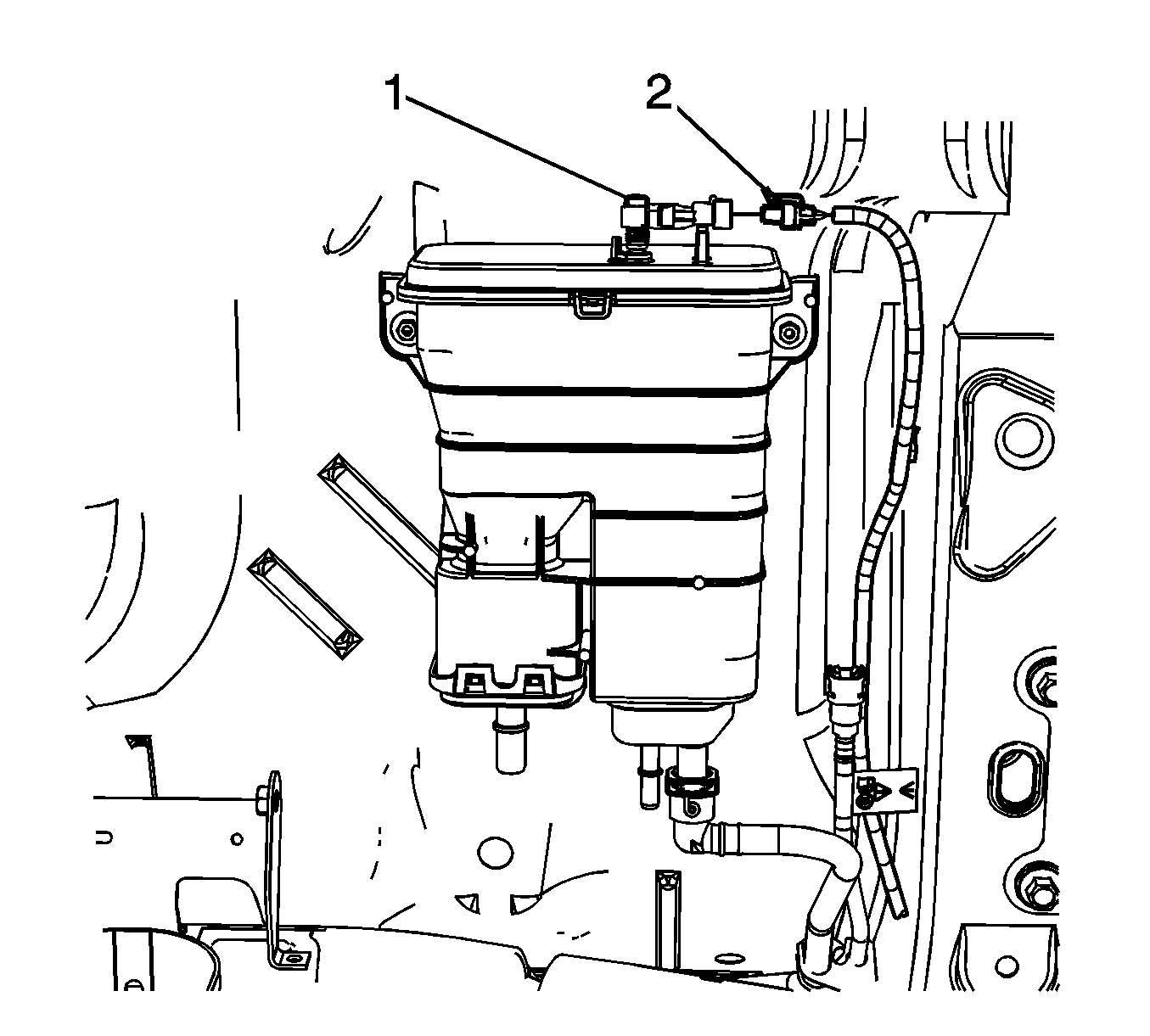







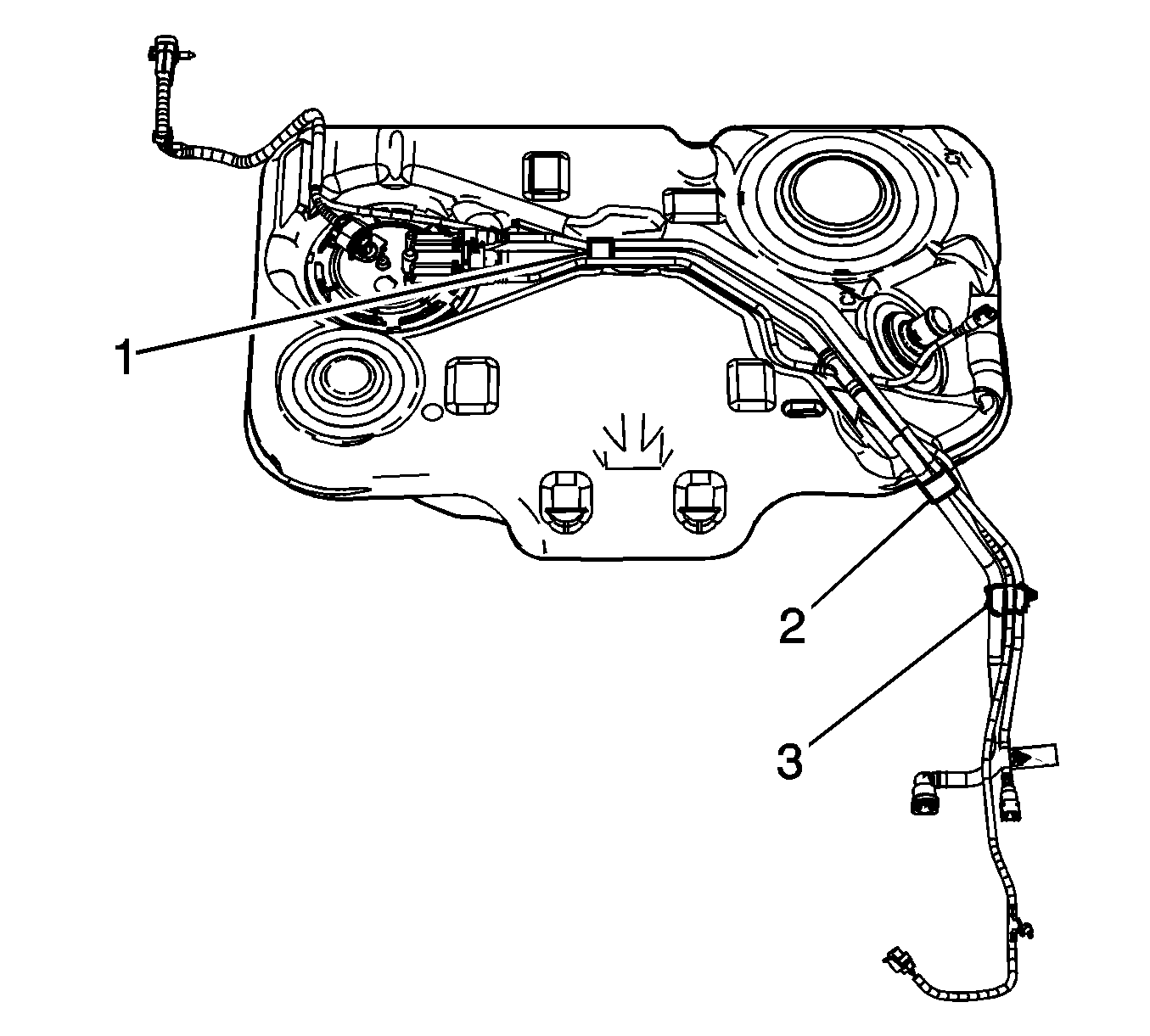
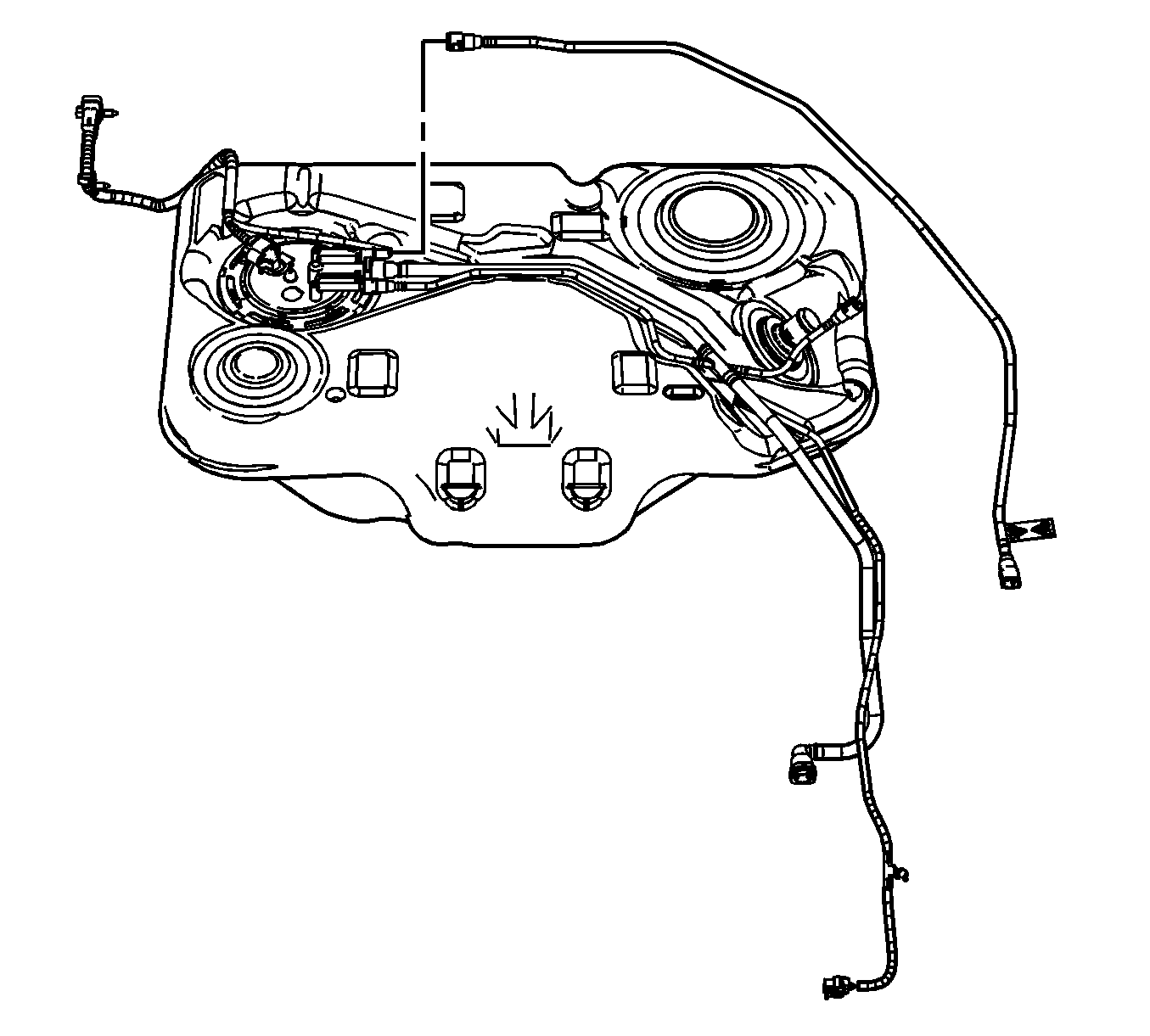
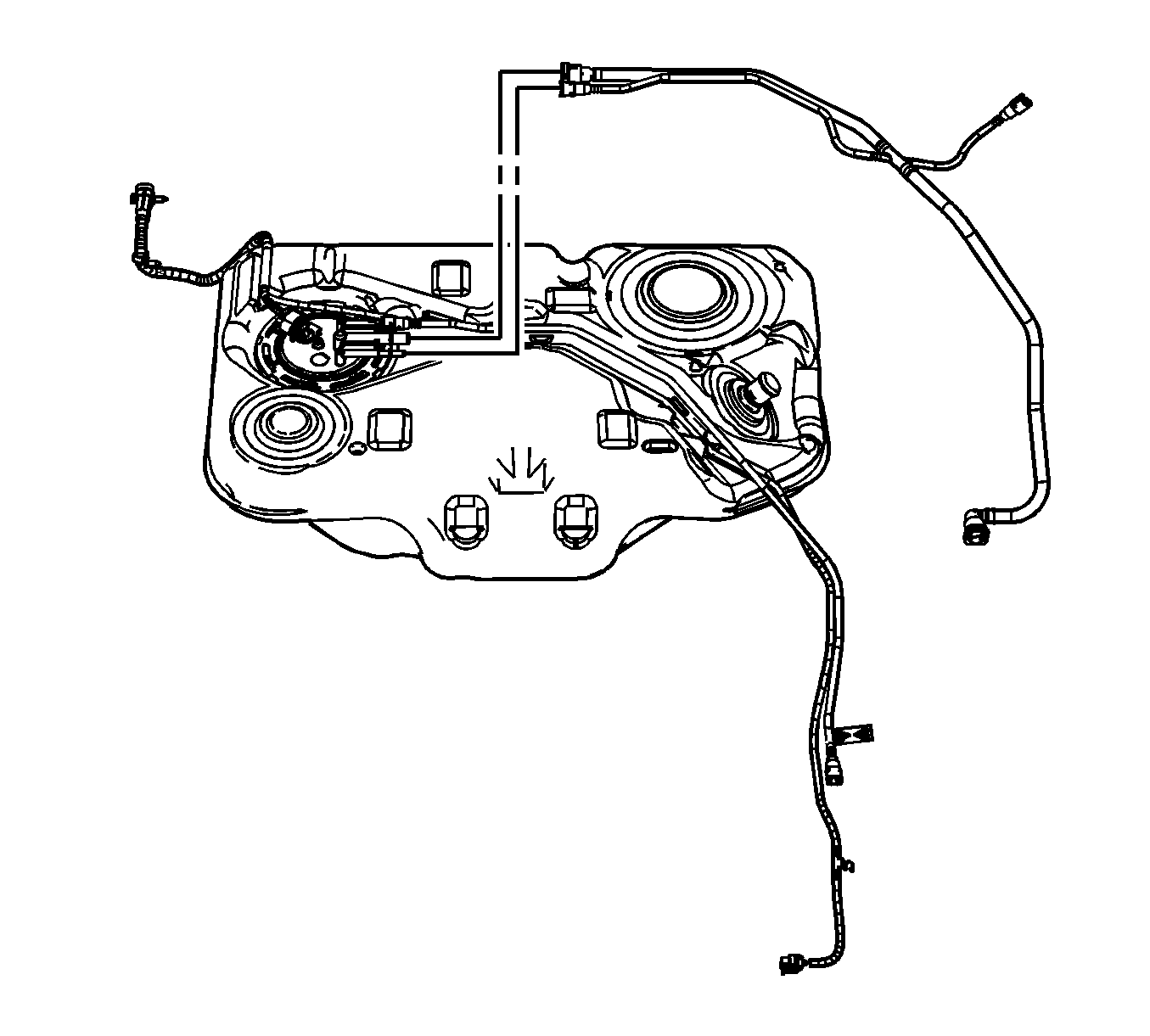
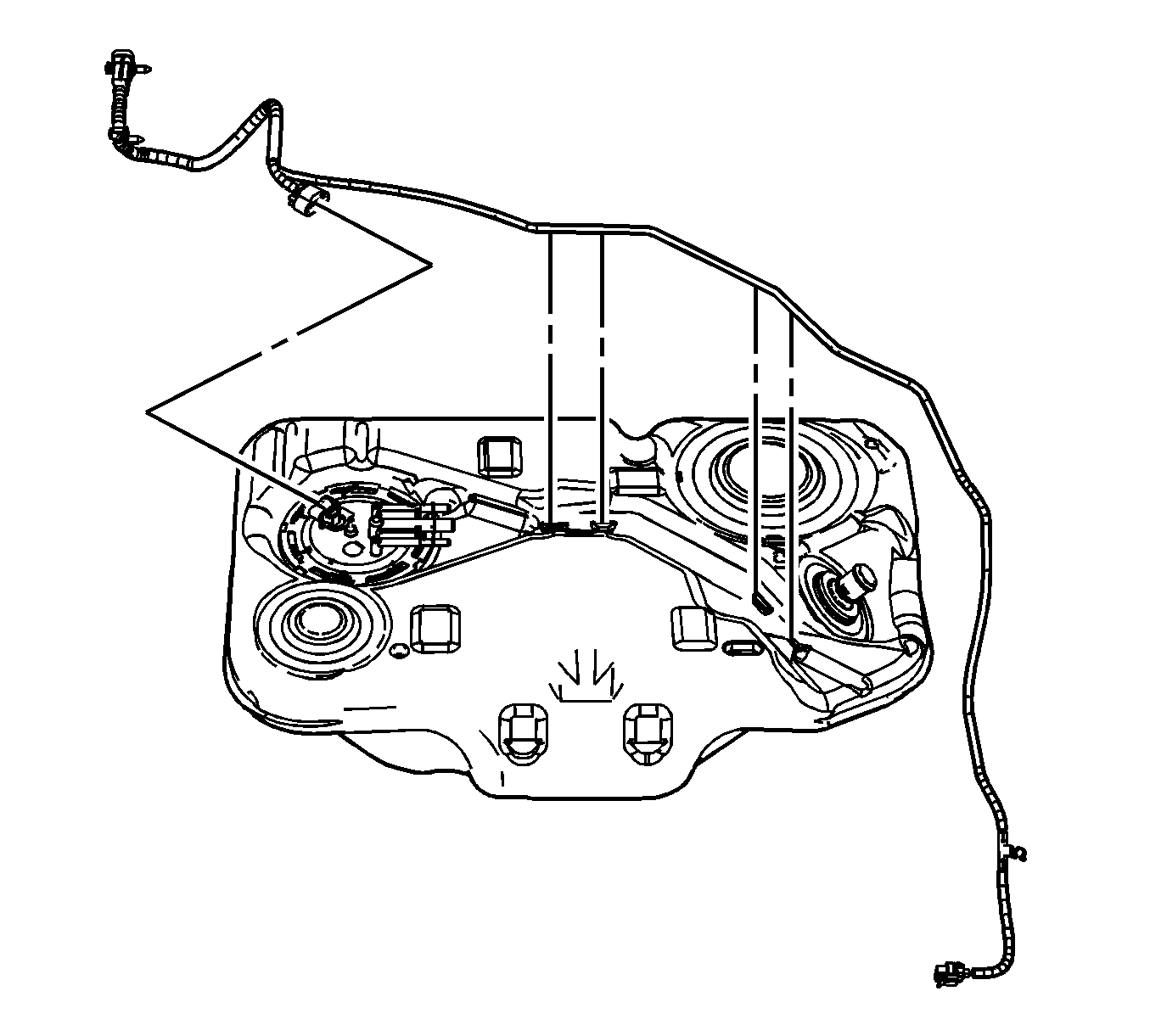
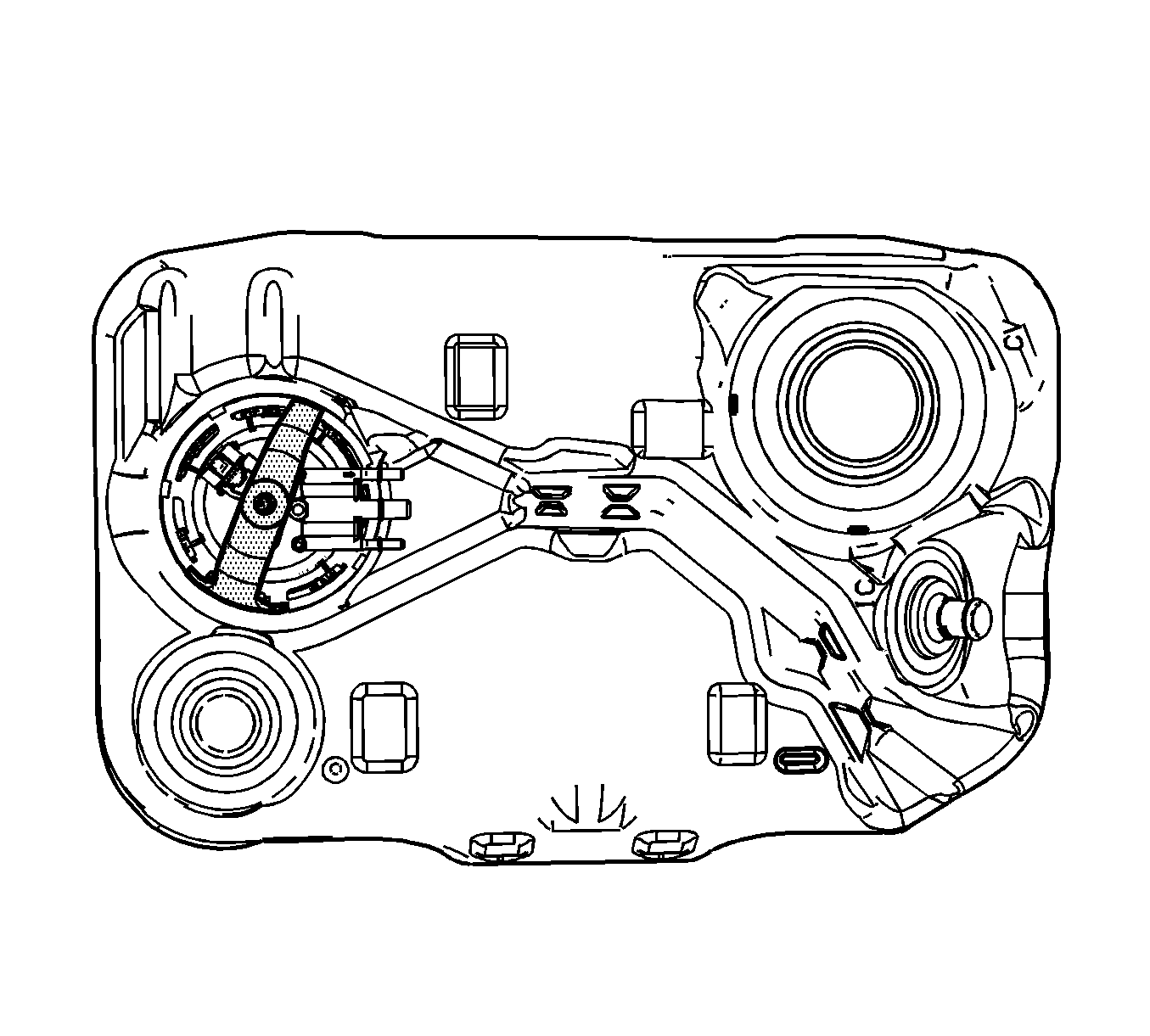

Notice: Avoid damaging the lock ring. Use only J-45722 to prevent damage to the lock ring.
Notice: Do Not handle the fuel sender assembly by the fuel pipes. The amount of leverage generated by handling the fuel pipes could damage the joints.
Important:
• The fuel module assembly may spring up from its position. • When removing the fuel module assembly from the fuel tank, be aware that
the reservoir bucket is full of fuel. It must be tipped slightly during removal to
avoid damage to the float. Discard the fuel module assembly O-ring seal and replace
it with a new one. • Carefully discard the fuel in the reservoir bucket into an approved container.
Important: Do NOT use impact tools. Significant force will be required to release the lock ring. The use of a hammer and screwdriver in not recommended. Secure the fuel tank in order to prevent fuel tank rotation.
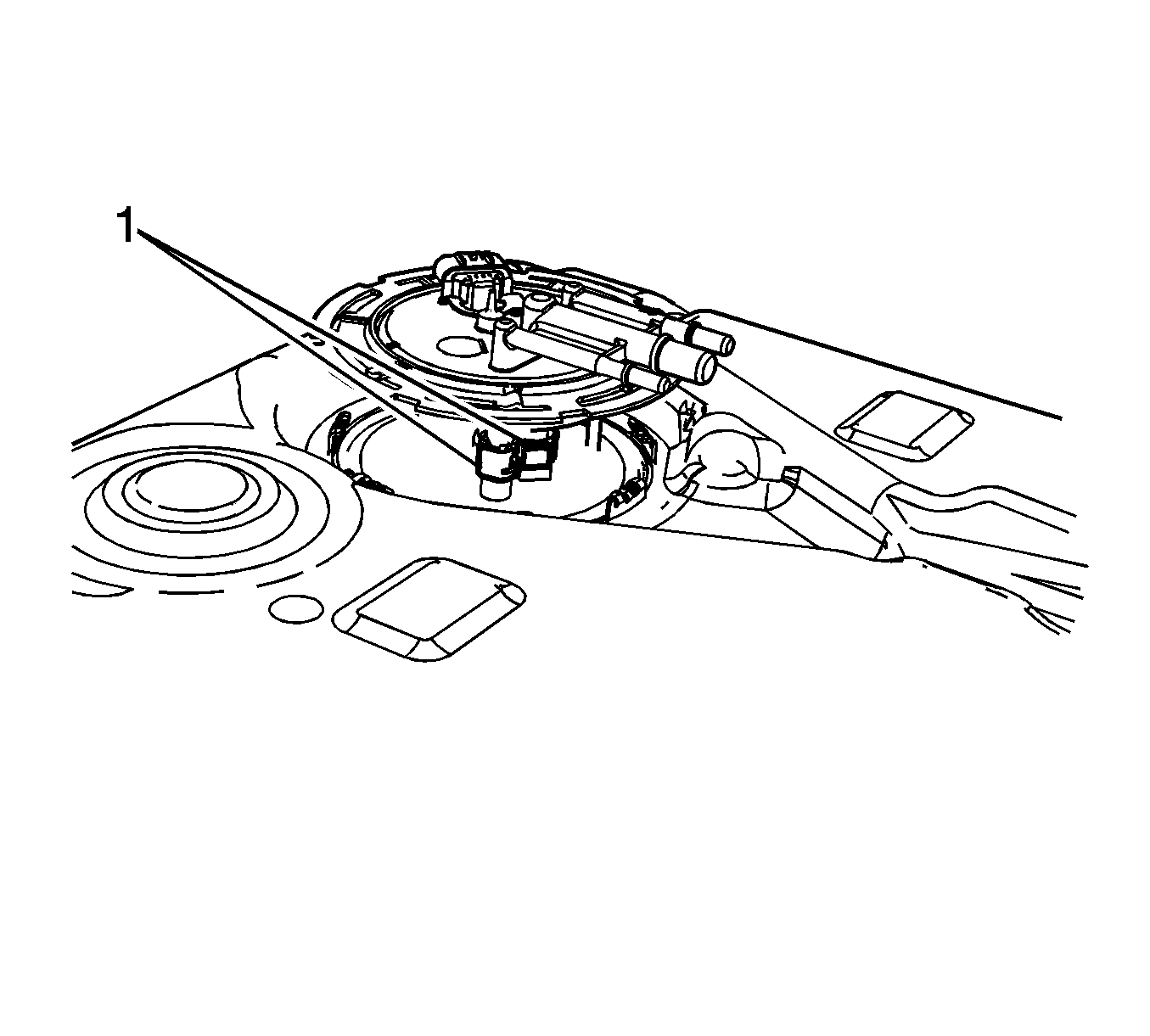
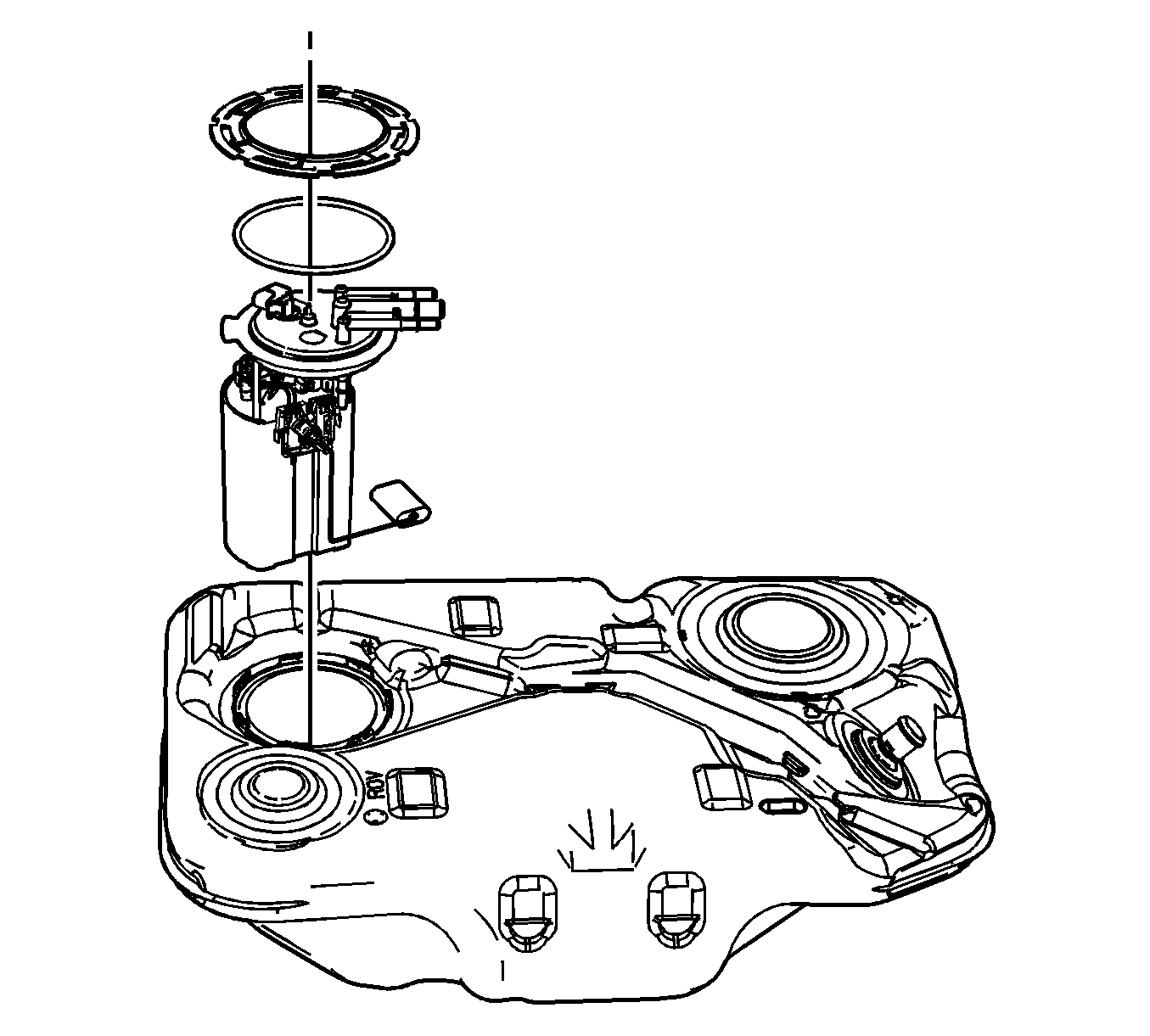
Important: When removing the module from the fuel tank, be aware that the reservoir bucket is full of fuel. The module must be tipped slightly during removal to avoid bending the fuel level sensor float arm.
Important: DO NOT reuse the old fuel pump module seal.

Important:
• Some lock rings were manufactured with DO NOT REUSE stamped into them.
These lock rings may be reused if they are not damaged or warped. • Inspect the lock ring for damage due to improper removal or installation
procedures. If damage is found, install a NEW lock ring. • Check the lock ring for flatness.
Installation Procedure
- Place a NEW fuel pump module O-ring seal onto the fuel tank.
- Tilt the module toward the rear of the fuel tank to allow the fuel level sensor float arm to clear the tank opening. Install the module into the fuel tank.
- Install the module lock ring, and move it into position on the top of the module.
- Lower the module assembly into the tank until the internal vent line quick connect fittings can be connected.
- Connect the internal vent line quick connect fittings to the module flange. Refer to Plastic Collar Quick Connect Fitting Service .
- Install the J 45722 to the lock ring .
- Using the J 45722 and a breaker bar, rotate the fuel pump module lock ring clockwise until the ring is locked into place on the fuel tank.
- Remove the J 45722 .
- Install the electrical harness.
- Connect the fuel tank electrical harness connector to the module.
- Install the electrical harness to the retaining features on the fuel tank.
- Install the fuel tank vent lines.
- Connect the fuel tank vent line quick connect fittings to the module. Refer to Plastic Collar Quick Connect Fitting Service .
- Install the fuel feed line.
- Connect the fuel feed line quick connect fitting to the module. Refer to Plastic Collar Quick Connect Fitting Service .
- Install the retainer (3) to the vent and fuel feed lines.
- Install tape (1 and 2) to the fuel tank vent and fuel feed line in order to secure the lines.
- Place the fuel tank onto the rear suspension crossmember.
- Install the fuel tank straps.
- Install the fuel tank strap bolts.
- Install the rear coil springs while slowly raising the rear suspension crossmember using the adjustable jack (1).
- Install the rear suspension crossmember bolts.
- Remove the adjustable jack from the rear suspension crossmember.
- Remove the jack stand from the front of the vehicle.
- Install the rear shock bolts.
- Connect the body harness electrical connector to the fuel tank harness electrical connector (1).
- Install the fuel tank harness clips (2, 3) to the rear compartment side rail.
- Install the fuel and EVAP line retainer (1) to the side rail.
- Connect the fuel tank wiring harness electrical connector (2) to the fuel tank pressure sensor.
- Connect the fuel feed line quick connect fitting (1) to the chassis line. Refer to Plastic Collar Quick Connect Fitting Service .
- Connect the fill pipe vent line (2) and the fuel tank vapor line (3) quick connect fittings to the EVAP canister. Refer to Plastic Collar Quick Connect Fitting Service .
- Install the left and right rear brake hose bracket studs into the keyhole slots. Tighten the nuts. (left side shown, right side similar).
- Install the exhaust system. Refer to Exhaust System Replacement .
- Connect the left and right electronic position sensor links (1) to the ball studs. (left side shown, right side similar).
- Connect the fuel tank EVAP recirculation line quick connect fitting (1) to the fill pipe line. Refer to Plastic Collar Quick Connect Fitting Service .
- Connect the fuel fill hose (2) to the fuel fill pipe.
- Tighten the fuel fill hose clamp (1) at the fill pipe.
- Install the left rear wheel house liner. Refer to Rear Wheelhouse Panel Liner Replacement .
- Fill the fuel tank.
- Connect the negative battery cable. Refer to Battery Negative Cable Disconnection and Connection .
- Perform the following procedure in order to inspect for leaks:
- Install the intake manifold cover. Refer to Intake Manifold Cover Replacement .

Important: the bucket must be slightly during installation to avoid bending the fuel level sensor float arm.



Important: Always replace the fuel sender seal when installing the fuel sender assembly. Replace the lock ring if necessary. Do not apply any type of lubrication in the seal groove.
Ensure the lock ring is installed with the correct side facing upward. A correctly installed lock ring will only turn in a clockwise direction.





Notice: Refer to Fastener Notice in the Preface section.
Tighten
Tighten the bolts to 46 N·m (34 lb ft).

Tighten
Tighten the bolts to 191 N·m (141 lb ft).

Tighten
Tighten the bolts to 25 N·m (18 lb ft).






Tighten
Tighten the nut to 10 N·m (89 lb in).


Important: Clean the fill pipe or any dirt or debris. Ensure the fill pipe is installed to the original depth to the fill hose. The fill pipe bead must be inserted into the hose past the clamp position.

Tighten
Tighten the clamp to 4 N·m (35 lb in).
| 41.1. | Turn ON the ignition, with the engine OFF for 2 seconds. |
| 41.2. | Turn OFF the ignition for 10 seconds. |
| 41.3. | Turn ON the ignition, with the engine OFF. |
| 41.4. | Inspect for fuel leaks. |
